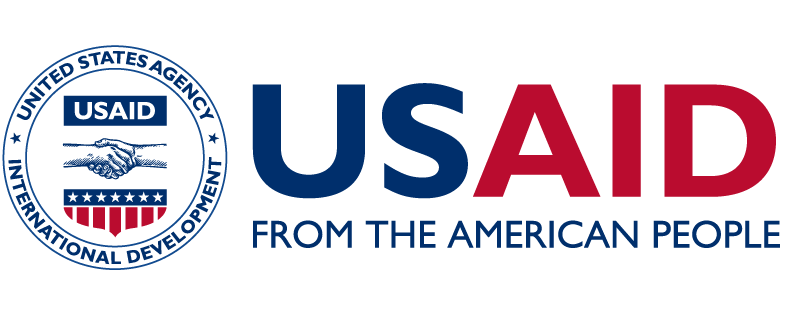
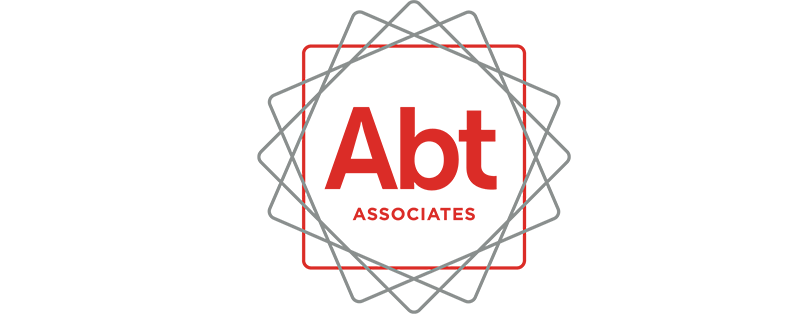
Health Financing is a newsletter produced by the USAID Health Financing Improvement Program. The Program collaborates with the Ethiopian government to further strengthen health financing functions and systems to support universal health coverage of quality primary health care services for Ethiopian citizens with reduced financial barriers. Abt Associates implements the Program in collaboration with core partners Breakthrough International Consultancy, the Institute for Healthcare Improvement, and Results for Development, and resource partner Harvard School of Public Health. Cooperative Agreement No.: 72066319CA00001.
To receive an email when new content is added to the Health Financing newsletter website,
contact Deborah Ventimiglia, Abt Associates, deborah_ventimiglia@abtassoc.com
MARCH 2024
USAID Mission Director Visits Harari Region to Witness Health Care Financing Reforms
USAID Mission Director for Ethiopia, Scott Hocklander and his team visited the Harari Regional Health Bureau and Jinela Health Center on October 20, 2023. The purpose of the visit was to learn about the impact of the community-based health insurance (CBHI) program and other health care financing reform activities USAID supports.
Harari is one of the best performing regions in Ethiopia in terms of CBHI enrollment and health service utilization. According to Yassin Abdulahi, the head of the Harari Regional Health Bureau, 100% of the eligible population is enrolled in CBHI, and over 110,000 people received financial coverage through their membership when accessing health care services in 2022/23.
Click here to read the full article

Photo credit: Ayenew Haileselassie, Abt Associates
USAID Mission Director for Ethiopia, Scott Hocklander talks to the head of the Harari Regional Health Bureau.
MARCH 2024
A Life Free from the Worries of Health Care Expenses
Yetenayet Asfaw is 50 years old and lives with her son and grandson in Kebele 15 of Jinela District in the Harari Region. She and her son work as daily laborers, engaging in low paying jobs such as washing clothes and running errands.
Yetenayet and her household joined the community-based health insurance (CBHI) program as indigent members because they have a low income and struggle to afford health care. The CBHI program aims to improve the health and well-being of households in the informal sector based on the principles of solidarity to share the risk of health problems with other members for an annual premium.
Click here to read the full article
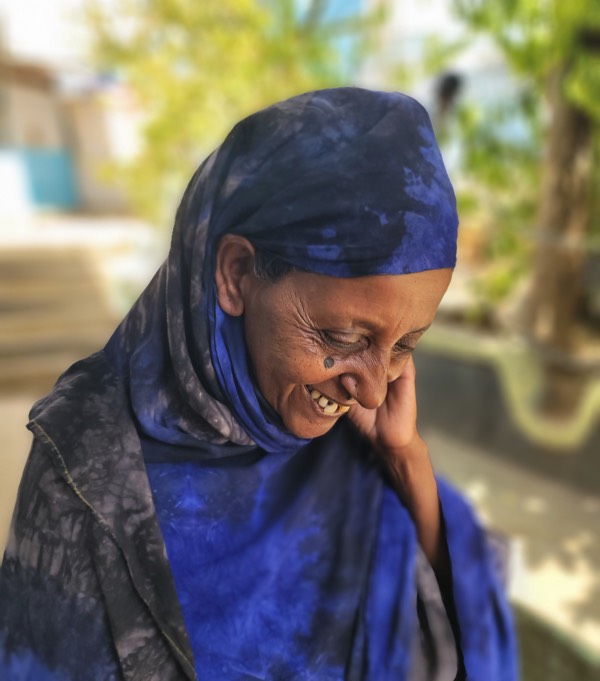
Photo credit: Ayenew Haileselassie, Abt Associates
Yetnayet Asfaw feels more secure in life because of CBHI membership.
MARCH 2024
How CBHI Supported Berhane’s Life: A Woman’s Story of Health and Hope
(Brehane Hailu met USAID’s Mission Director for Ethiopia, Scott Hocklander during his visit to the Harari Region in October 2023. She discussed how CBHI has impacted her family).
Brehane Hailu is a 30-year-old woman who runs a small retail shop in Harari. Her husband works in the maintenance of electrical equipment. Together, they have two children, with another one on the way. Since 2018, her household has been a member of community-based health insurance (CBHI), which continues to improve their lives.
Every year, the family has paid 570 Birr premium to ensure that they have access to the best health care possible. “We never know when sickness will strike, so it is good to be prepared,” Brehane said.
Click here to read the full article

Photo credit: Ayenew Haileselassie, Abt Associates
With CBHI membership, Brehane Hailu is prepared for the unpredictable time when her family needs medical care.
MARCH 2024
Ethiopian Health Insurance Service Conducts Annual Review Meeting
The Ethiopian Health Insurance Service (EHIS) held a three-day annual review meeting on November 9 -11, 2023 with representatives from resource mobilization and partnership directorate of regional health bureaus and branches of EHIS. The purpose of the meeting was to review EHIS performance in the previous budget year and to discuss its plans for the current year. The meeting highlighted the achievements of the community-based health insurance (CBHI) program, which covers citizens in the informal sector, who can access health care services using their membership ID cards.
The CBHI program was piloted in 13 woredas in 2011 and has now expanded to 1,006 woredas out of 1,246 in Ethiopia. As of October 2023, 12.5 million households in the informal sector are enrolled in CBHI, covering 58 million people, more than half of the country’s population. This includes over 11.6 million beneficiaries in 2.47 million poor households, whose premiums are fully subsidized by the government.
Click here to read the full article

Photo credit: Ayenew Haileselassie, Abt Associates
Dr. Dereje Duguma (right), State Minister of Health, awards a trophy during the EHIS annual review meeting, as Tesfaye Worku, Director of EHIS (left) watches.
MARCH 2024
Community Pharmacies Boost Drug Supply and Revenue in Harari Region
In 2022, the Harari Regional Health Bureau opened nine community pharmacies at eight health centers and one hospital using a 12 million birr loan from the local community-based health insurance (CBHI) program. The pharmacies are intended to improve the availability and accessibility of drugs for patients and the community, and to generate income for the health centers.
Jinela Health Centre is one of the beneficiaries of the project, which used the 1.2 million birr to stock its new community pharmacy. The pharmacy opened its doors in May 2023 and has been contributing to addressing the drug supply shortage.
Click here to read the full article

Photo credit: Ayenew Haileselassie, Abt Associates
Zahab Ahmed, pharmacist fills the prescriptions of patients at the community pharmacy.
MARCH 2024
Council Approves Contribution According to Capacity to Pay for Community-Based Health Insurance
The national council of community-based insurance, chaired by Deputy Prime Minister and Foreign Minister Demeke Mekonnen, has approved sliding scale contribution for CBHI and the revenue distribution across tiers of pools to be implemented nationally starting from the 2017 budget year (2024/25). The decision was made at a meeting held at Skylight Hotel in Addis Ababa on Monday, January 1, 2024. The meeting was attended by the council members, including government ministers, presidents of regional States, mayors of city administrations, regional health and finance bureaus, regional heads of Prosperity Party, and the Ethiopian Health Insurance Service.
When CBHI was launched in 2010 in 13 woredas in four regions of the country, there was a uniform contribution across all woredas. During scale up, there was differentiated contribution amount in agrarian, urban and pastoralist woredas of a region
Click here to read the full article

Photo credit: Ayenew Haileselassie, Abt Associates
Meeting held at Skylight Hotel in Addis Ababa.
AUGUST 2023
Service Contract with a Private Clinic Expands Health Care Options for CBHI Members in Amhara Region
Members of community-based health insurance (CBHI) schemes in Burie town and Burie Zuria and Womberima woredas in Amhara region used to incur out-of-pocket expenses for medications and diagnostic services when they were not available at the public health facilities that were contracted to provide care for CBHI beneficiaries. This can occur when the facilities have drug stockouts or limited laboratory and radiology services. In addition, the CBHI members experienced long waiting times when seeking reimbursement for their out-of-pocket payments.
Recognizing these challenges, Amhara Regional Health Bureau with support from the USAID Health Financing Improvement Program initiated contractual arrangements with private health facilities to improve access to drugs and diagnostic services for CBHI members.
Click here to read the full article

Photo credit: Abay Akalu, Abt AssociatesCBHI member gets prescriptions filled at Bekele Internal Medicine Specialty Clinic, Burie town.
JULY 2023
Health Care Financing Reform Enables Geda Health Center to Provide Emergency Surgical Services to the Community
Before May 2022, Geda Health Center in Adama, Oromia, would refer all patients needing surgery to other health facilities, such as Adama Hospital. As a result, patients requiring urgent surgical care might not receive it in a timely manner, depending on how quickly they could travel to and be treated at a referral facility. To improve patient access to emergency surgical services—particularly for maternal care—Geda’s governing board sought and obtained approval from the regional health bureau to introduce surgical services for caesarean section and other emergency surgeries.
In Ethiopia, health facility governing boards are established in public hospitals and health centers to provide oversight, direction, and guidance to health facility management, including on health care financing reform implementation. Having a governing board also allows for greater facility-level decision-making on how facility finances are used to improve service delivery and add services like surgical care.
Click here to read the full article
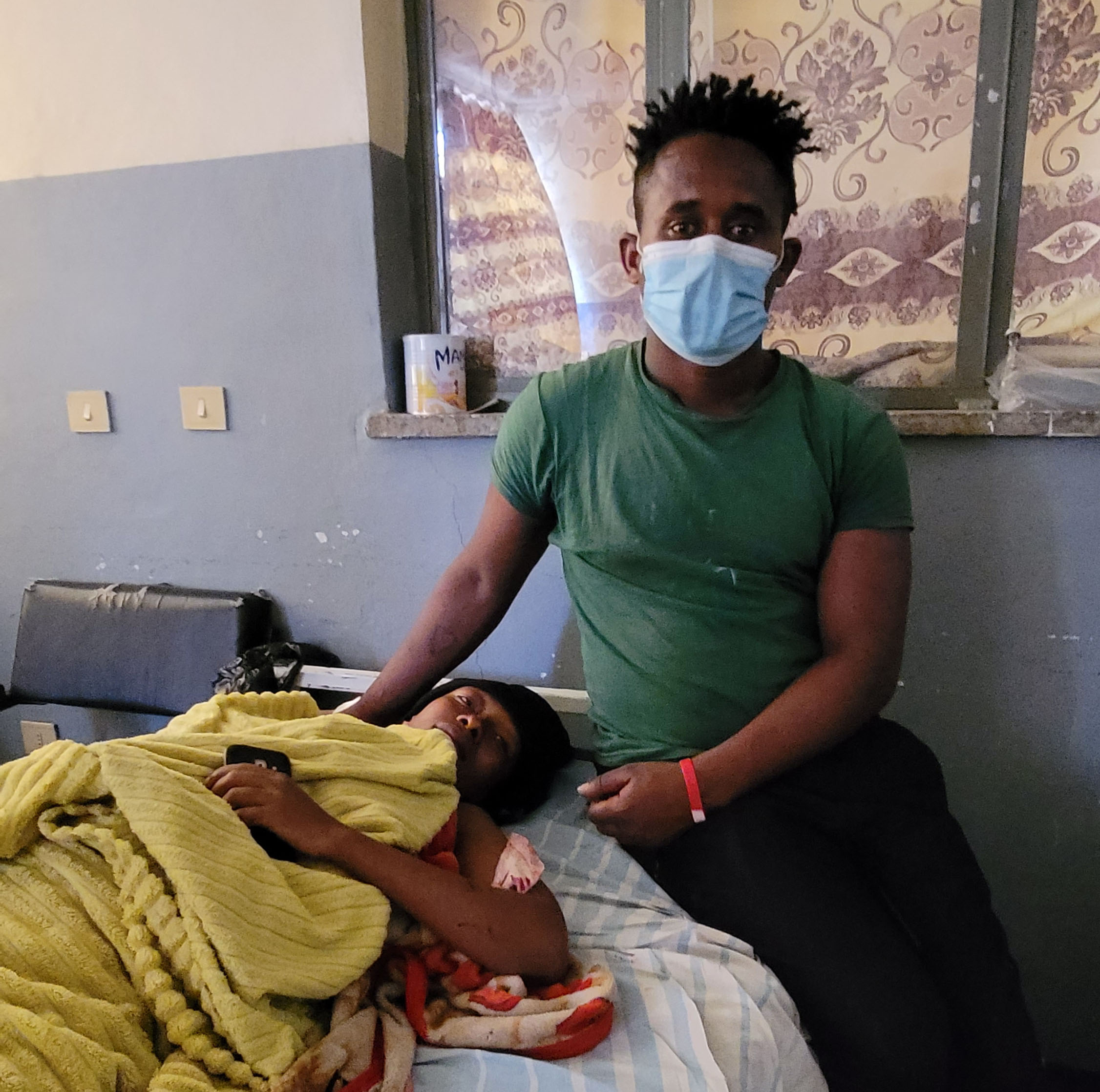
Photo credit: Ayenew Haileselassie, Abt Associates
Sitota and her husband Tura Jeba at Geda Health Center
JUNE 2023
Insourcing Private Providers in Public Health Facilities Improves Diagnostic Services
Before 2020, clients of Shiromeda Health Center of Gullele Subcity in Addis Ababa were referred to private diagnostic facilities where they paid up to 400 Birr for an ultrasound exam. This was because Shiromeda lacked institutional capacity to offer ultrasound services in the health center. To address this gap, Shiromeda CEO Mr. Gurmesa consulted the subcity’s public service office, finance office, and health office, and the Addis Ababa City Administration (AACA) Health Bureau about hiring an outside provider to make ultrasound services available in the health center. In 2020, with the approval from the subcity’s administration, Shiromeda began ‘insourcing’ a private provider to provide ultrasound services. After soliciting competitive tenders, the health center contracted a licensed private radiographer with a portable ultrasound machine, who provides ultrasound services for a fixed rate of 100 Birr per service to a patient. Shiromeda provides the space, a printer and paper, and other necessary equipment and supplies. It also collects the fee for the service: either clients pay out of pocket, or community-based health insurance (CBHI) reimburses the health center if the client is a beneficiary of a CBHI scheme.
Click here to read the full article
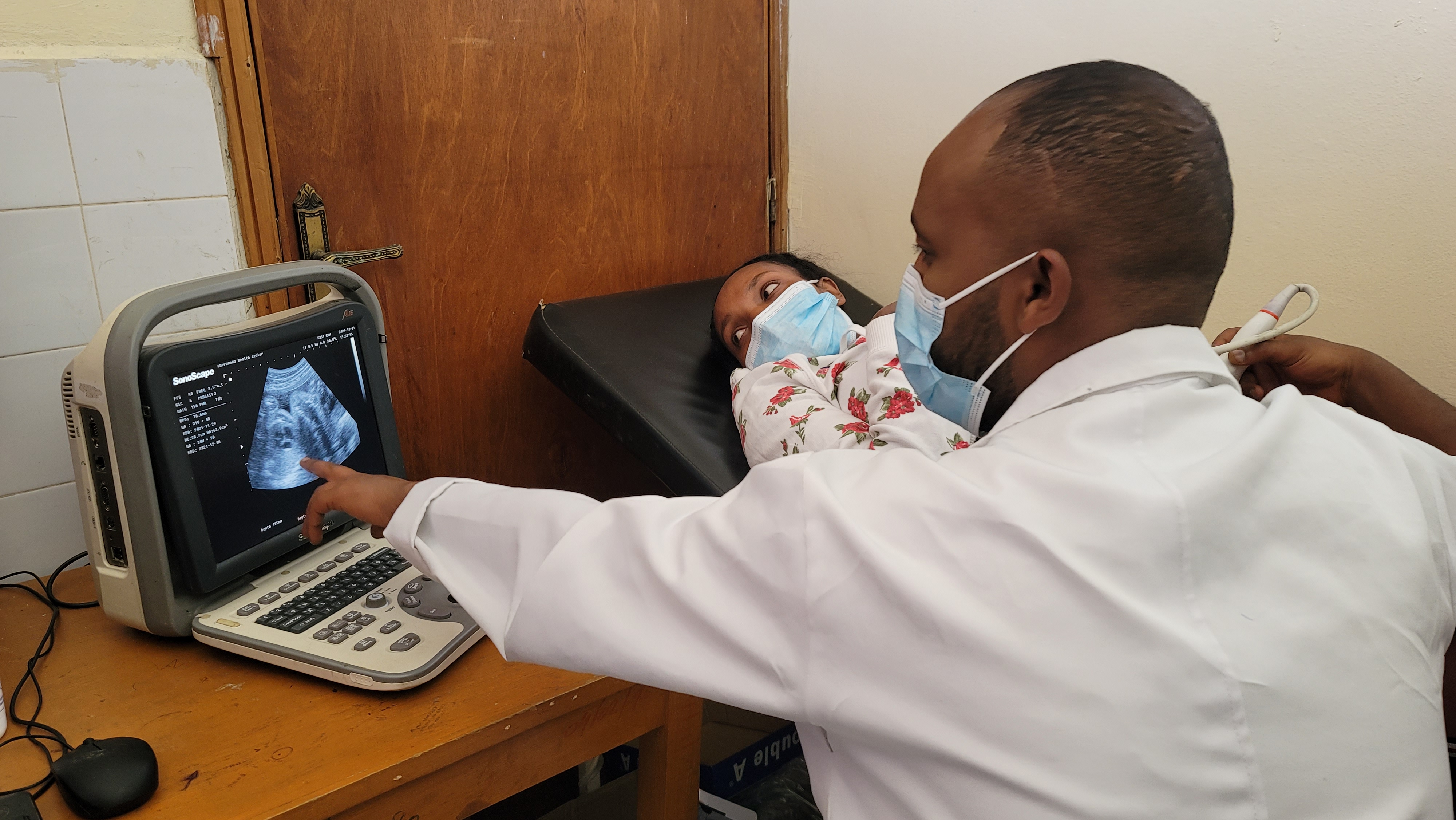
Photo credit: Ayenew Haileselassie, Abt Associates
Shiromeda Health Center contracts with a private, licensed radiographer to conduct ultrasound exams for patients like Alemnesh, shown here.
MAY 2023
Health Financing Reform Contributes to Quality Improvements at Health Centers
Revenue retention and utilization (RRU) is a health care financing reform in Ethiopia. Since 2008, RRU has allowed health facilities to retain and use the user fees they collect to finance activities believed to improve the quality of care they provide. Examples of such activities include purchasing essential drugs and medical supplies, upgrading the health facility infrastructure, and providing short-term training to healthcare workers. The retained revenue is additional to the government’s treasury allocation to health facilities.
The USAID Health Financing Improvement Program recently conducted a study to help the Ministry of Health (MOH) generate evidence on the extent to which RRU implementation is improving quality of services delivered by the health facilities. The study assessed six dimensions of quality—safety, effectiveness, equity, efficiency, timeliness, and patient-centeredness—in 73 randomly selected health centers in Addis Ababa, Amhara, Oromia, and Southern Nations Nationalities and Peoples’ (SNNP) regions.
Click here to read the full article
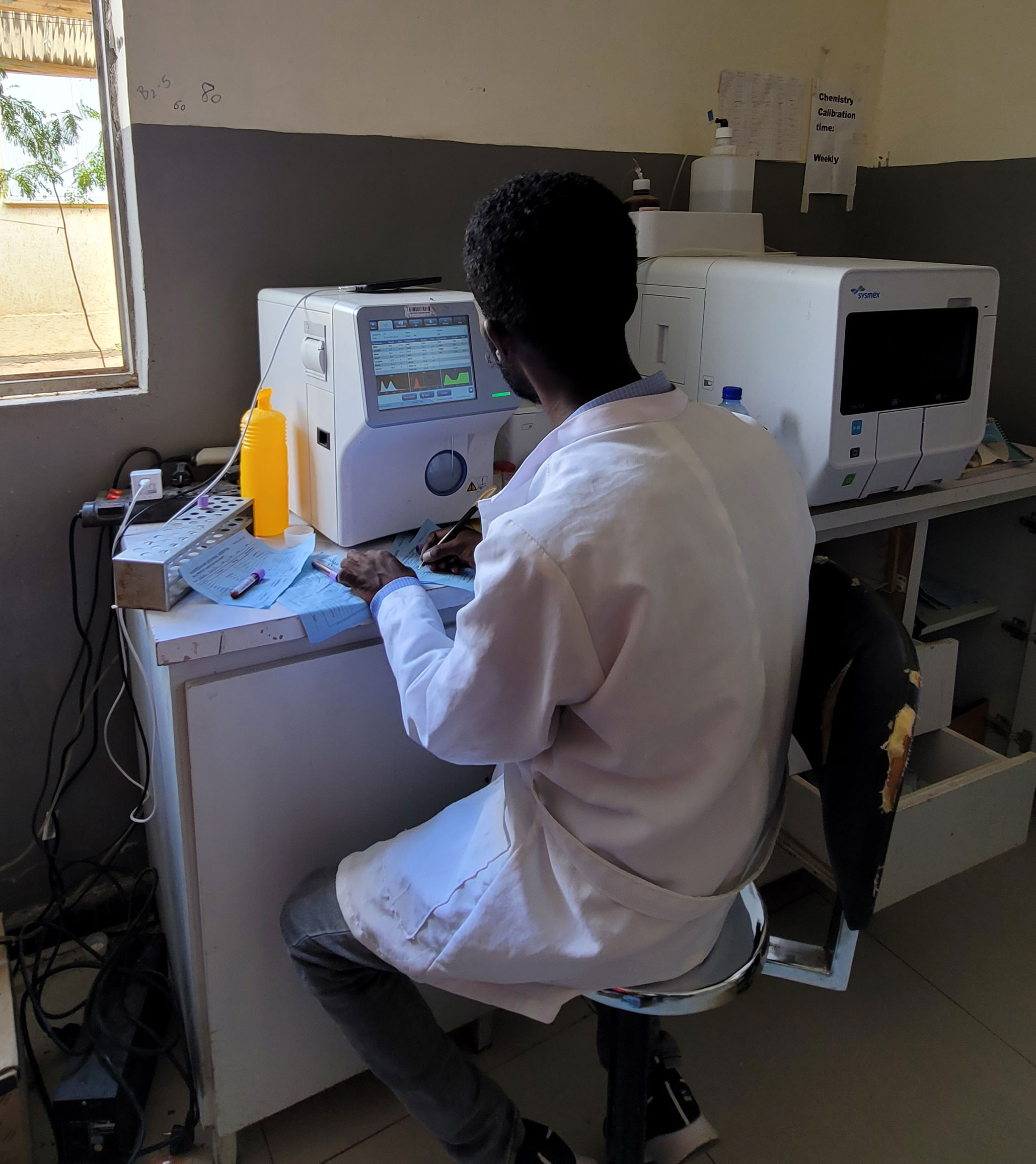
Photo credit: Ayenew Haileselassie, Abt Associates
A laboratory technician at Awbare Health Center in Somali Region performs diagnostic tests using equipment purchased with retained revenue.
DECEMBER 2022
USAID Health Financing Improvement Program Contributes to Gender Equality and Women’s Empowerment in Health Care Financing Activities in Ethiopia
The USAID Health Financing Improvement Program produced a gender analysis and strategy in its first year of implementation to ensure that its core activities supporting the Ethiopian government to strengthen and institutionalize health financing functions and systems considered gender equality and women’s empowerment.
Over the life of the Program, it has worked to advance gender equity and women’s empowerment in alignment with this strategy, including advocating for the greater inclusion of women where there were observed gender imbalances.
The Program’s gender analysis found that leadership, managerial, and board member representation in Ethiopia’s health care system are typically male-dominated. Therefore, getting strategies, legal frameworks, and implementation manuals in place that promote and require women’s representation are important steps toward institutionalizing change.
Click here to read the full article
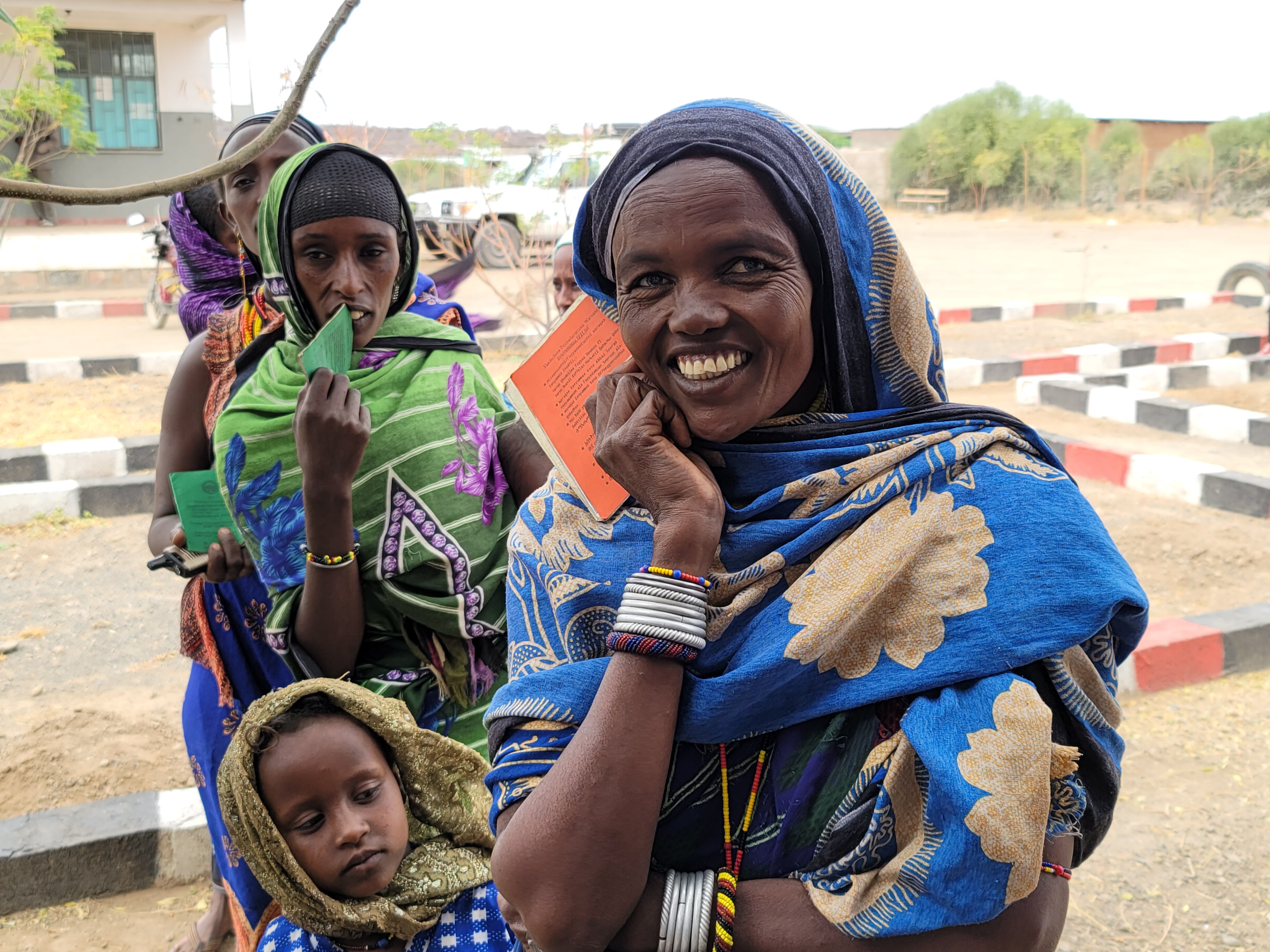
Photo credit: Ayenew Haileselassie, Abt Associates
Women CBHI members and their children access health care services at a health facility in Dillo Woreda, Oromia Region
DECEMBER 2022
USAID Health Financing Improvement Program Assists in Transferring Health Care Financing Reform Implementation Training to Government Counterparts
Beshir Mohamed, head of the new Partnership and Cooperation Directorate in the Addis Ababa City Administration (AACA) Health Bureau, is one of the faces of first-generation health care financing (HCF) reform institutionalization in Addis Ababa.
The USAID Health Financing Improvement Program (the Program) worked with the bureau to facilitate the creation of the new directorate which is responsible for HCF reform activities in the city administration. To further institutionalize reforms, the Program also supported the directorate to put in place capacity building arrangements so that the AACA health bureau can conduct first-generation HCF reform implementation training without the involvement of implementing partners, including the Program. Until 2021, training on how to implement first-generation HCF reforms across Ethiopia had relied heavily on external technical support.
Click here to read the full article
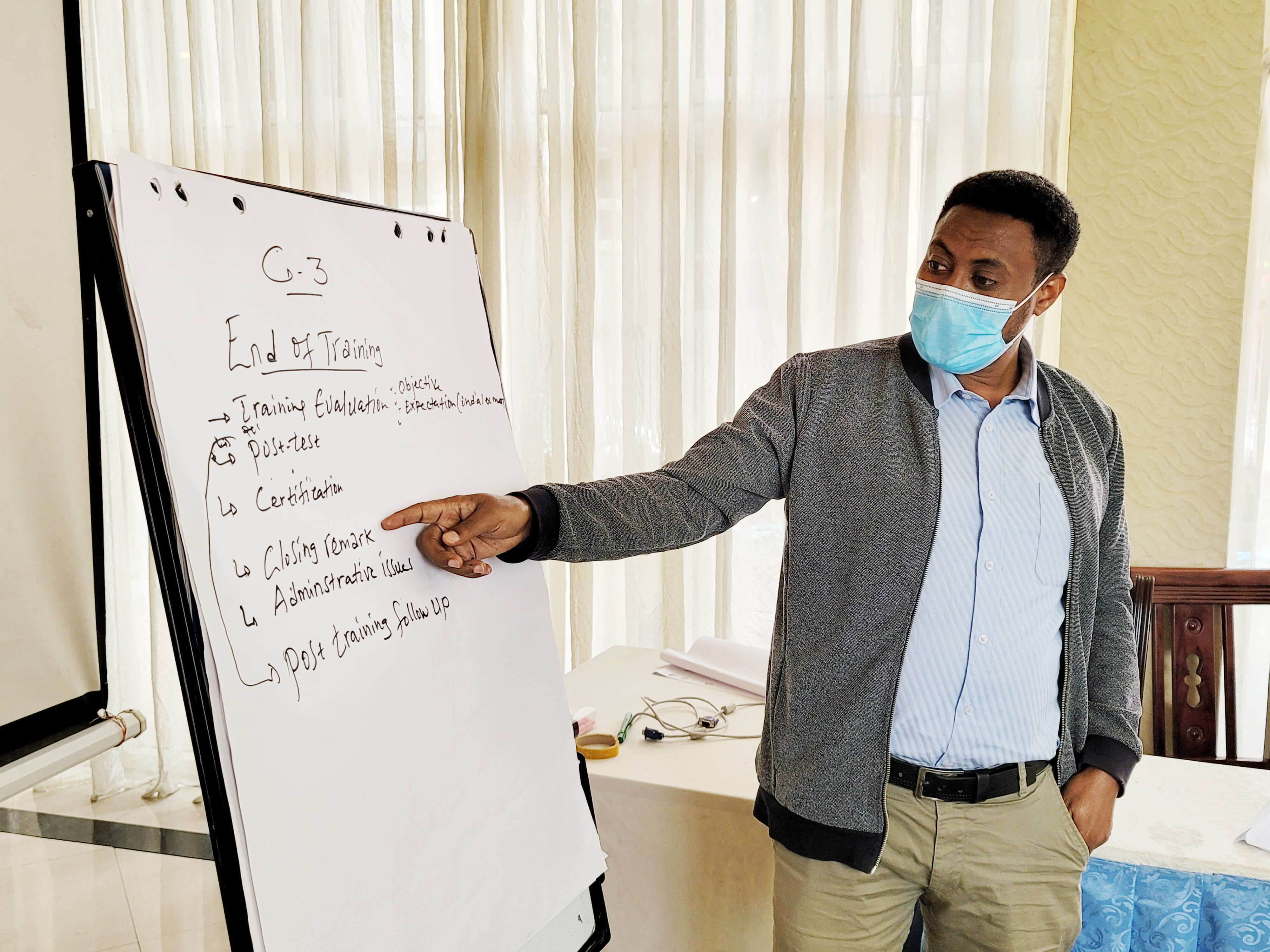
Photo credit: Ayenew Haileselassie
Beshir Mohamed presents during the TOT session organized by the USAID Health Financing Improvement Program and Addis Ababa City Administration Health Bureau.
DECEMBER 2022
Community-Based Health Insurance Benefits Communities in Somali Region
In the past, Hinde Mumed and her children may not have visited Awbare Health Center in Somali Region when they needed health care services. Concern about the potential cost of health services is a disincentive to many Ethiopians in accessing healthcare.
Now, the family knows they are entitled to use health care services here and in several other health facilities in the region, just by showing their CBHI membership card.
CBHI members pay a small annual contribution to enroll in CBHI, but nothing when they seek care at contracted health facilities for services covered under the CBHI benefits package. Thus, CBHI provides financial protection from the out-of-pocket costs of health care for members like Hinde. And in doing so, CBHI improves access to health services for low-income rural and urban households.
Click here to read the full article
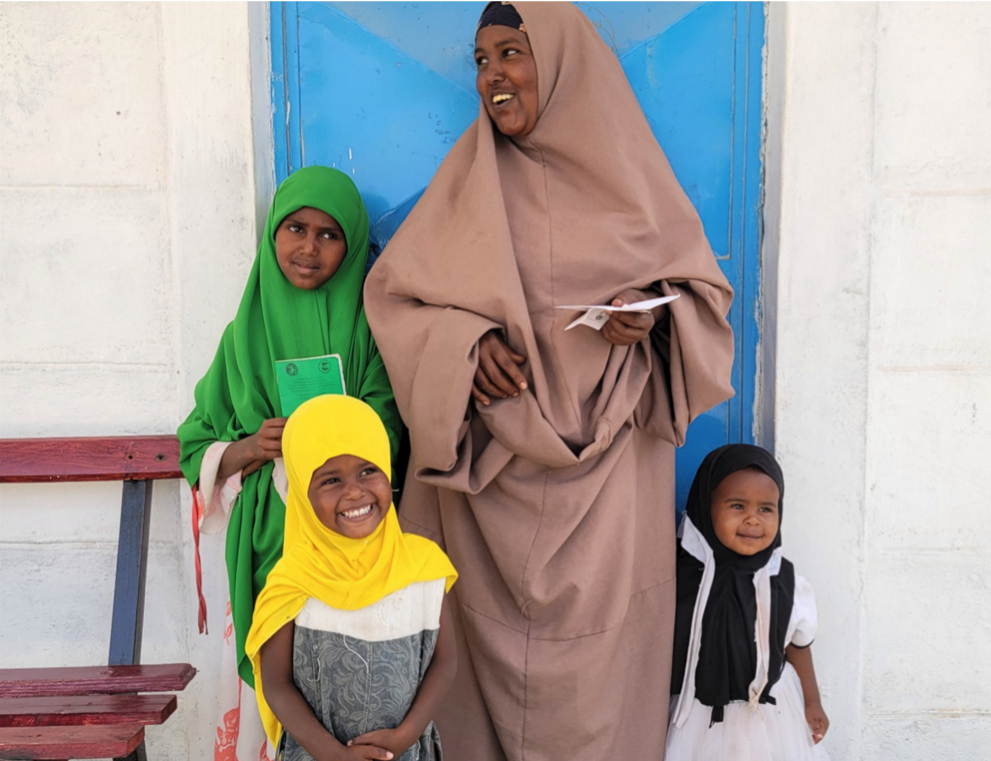
Photo credit: Ayenew Haileselassie, Abt Associates
CBHI beneficiaries Hinde Mumed and her daughters access health services at Awbare Health Center in Somali Region
OCTOBER 2022
CBHI is a Divine Gift for Borena Pastoralists
Woredas (districts) in the Borena Zone of Oromia Region launched community-based health insurance (CBHI) four years ago. At that time, many residents viewed CBHI skeptically. “We refused to accept community-based health insurance at first, because it was difficult for us to believe that a person could be treated for free with only a small membership contribution,” said Abba Kulddida Guyou, a traditional community leader.
But after much discussion, residents decided to enroll in CBHI and see if the claims were true. “When we tasted what we had been told, it was sweeter than honey. [Now] we consider CBHI a gift from God, especially when we see the benefits it provides to women and children. After the first year [of CBHI implementation], everyone renewed their membership,” Abba Kulddida said. Today, membership coverage across the zone’s 14 woredas has reached 90.4%.
Click here to read the full article
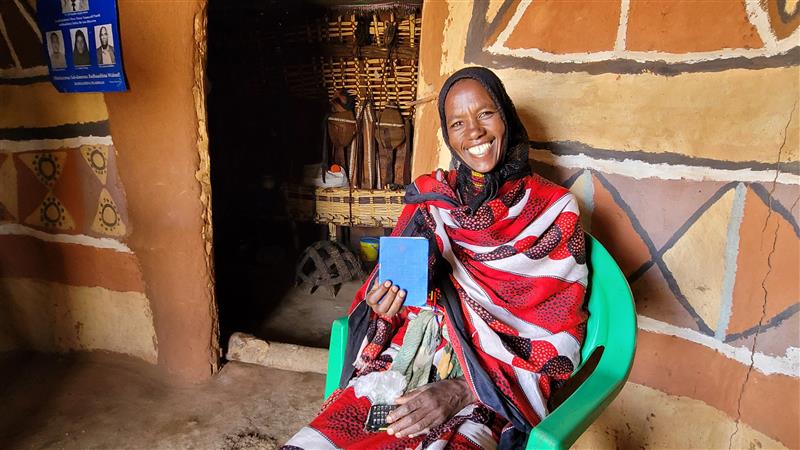
Photo credit: Ayenew Haileselassie
A CBHI beneficiary shows her CBHI membership identification card. Dillo Megala, Borena Zone
OCTOBER 2022
Oromia and SNNP Launch Zonal-Level CBHI Schemes
Oromia and Southern Nations, Nationalities and Peoples’ (SNNP) regions launched zonal-level community-based health insurance (CBHI) schemes in 2022. Having a greater number of CBHI households and their membership contributions combined in a zonal-level scheme helps further scheme stability and financial viability.
In Oromia, a zonal CBHI scheme was formally established by the Borena Zone Health Office, in collaboration with the Oromia Regional Health Bureau (RHB), Ethiopian Health Insurance Service, and USAID Health Financing Improvement Program, at a general assembly meeting held on June 16, 2022. Key attendees at the assembly included Tigist Teferi, RHB Deputy Bureau Head and Director of the RHB Resource Mobilization Directorate; Jarso Gelgelo, Borena Zone Chief Administrator; and Molu Dimma, Deputy Head, Borena Zone Health Department.
Click here to read the full article
Click here to read the East Gojjam Zone CBHI study report
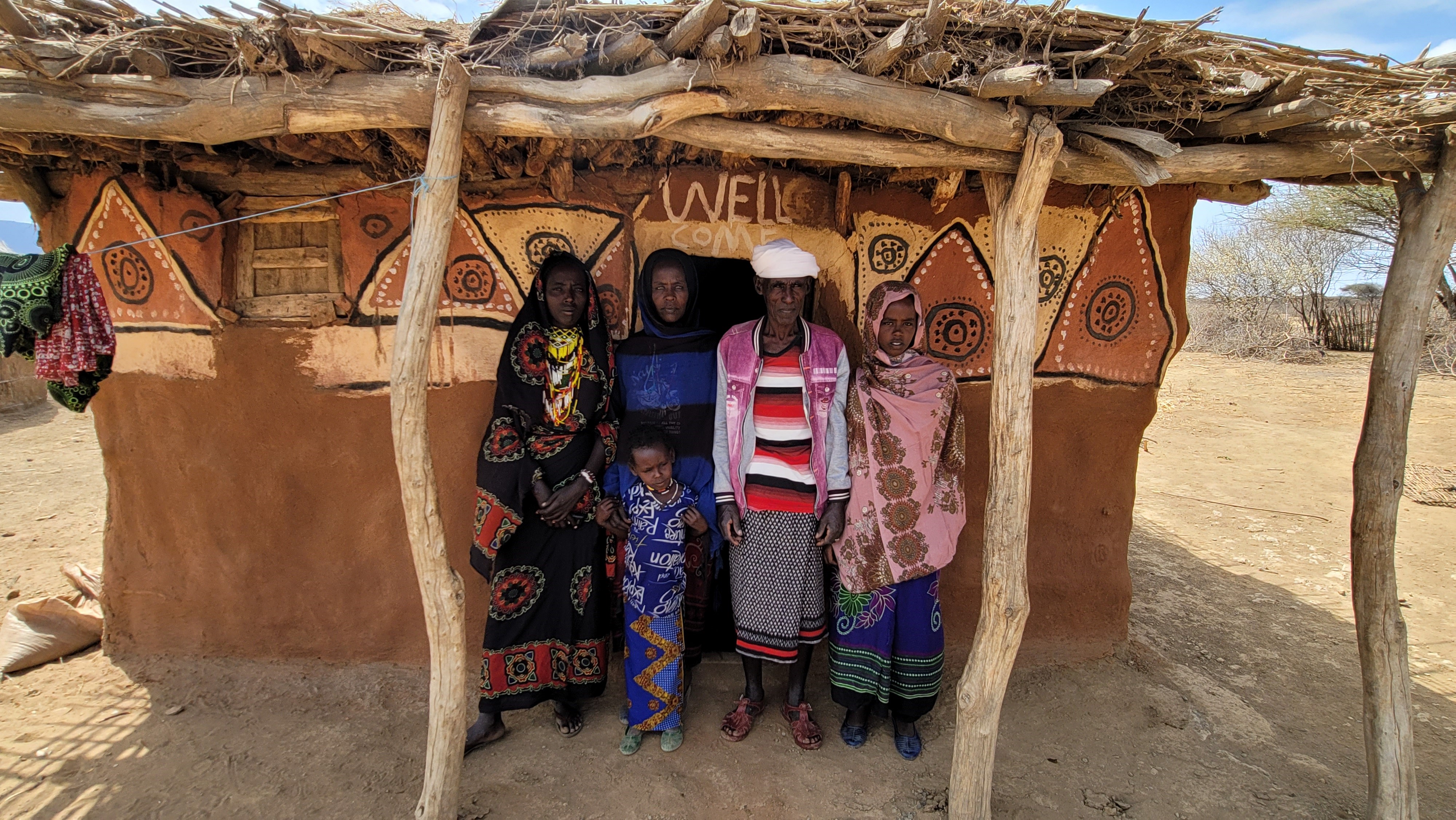
Photo credit: Ayenew Haileselassie, Abt Associates
A pastoralist household in Borena Zone, Oromia Region
OCTOBER 2022
Expanding CBHI in Urban Settings
Ethiopia launched community-based health insurance (CBHI) in 2011 in the predominantly agrarian regions of Amhara, Oromia, Tigray, and the Southern Nations, Nationalities, and Peoples’ (SNNP). Since this time, CBHI has expanded to all regions and city administrations across the country. As of June 2020, 72 urban areas of Amhara and SNNP had CBHI schemes, as did all woredas in Addis Ababa. For the most part, these urban schemes followed the same CBHI design as rural ones.
To inform future implementation of CBHI in urban areas, the USAID Health Financing Improvement Program conducted two assessments of urban CBHI schemes—one in Amhara and SNNP, and the other in Addis Ababa—in collaboration with the Ethiopian Health Insurance Service (EHIS) and regional counterparts.
Click here to read the full article
Click here to read the Addis Ababa assessment report
Click here to read the Amhara and SNNP assessment report
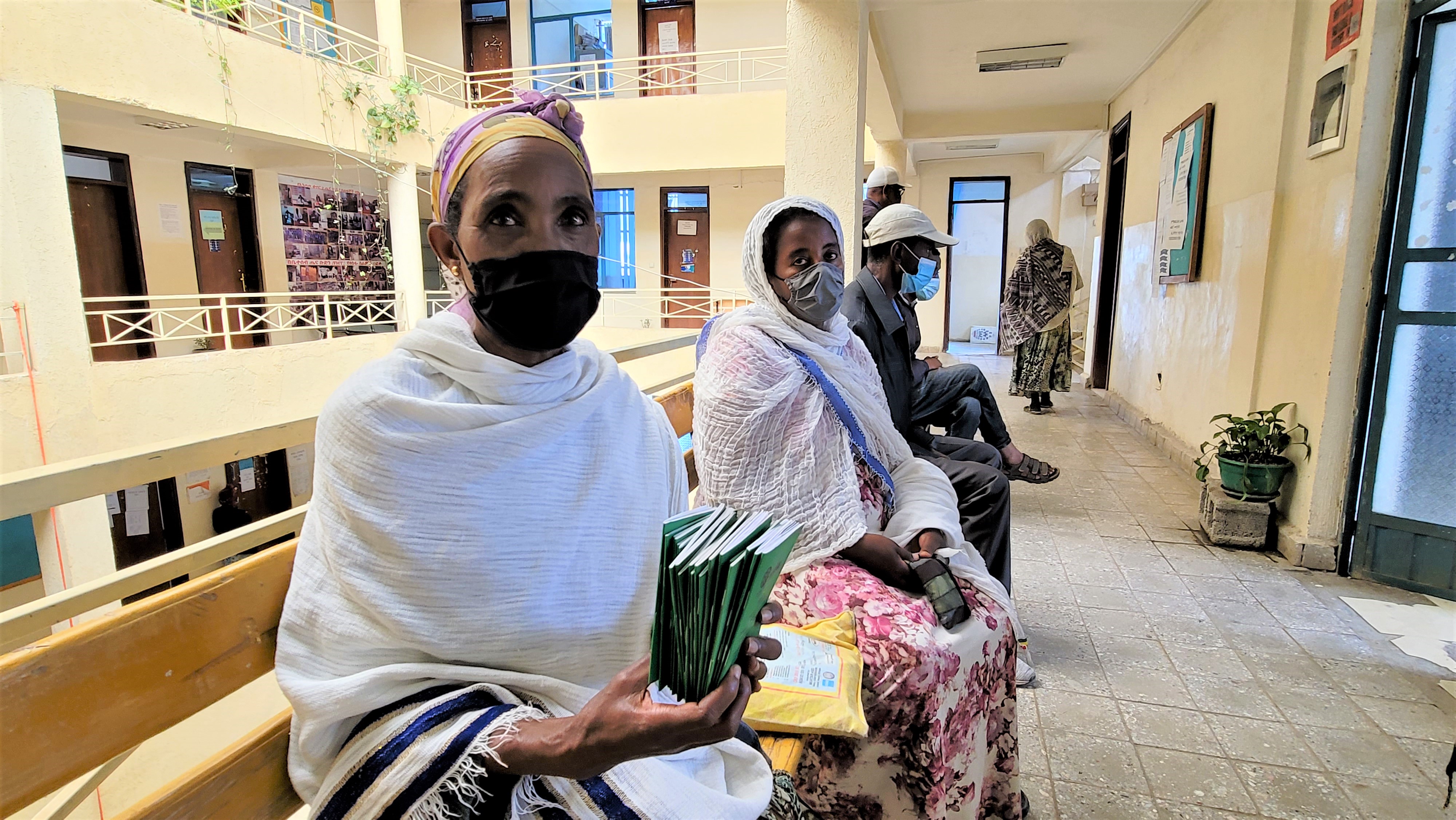
Photo credit: Ayenew Haileselassie
A CBHI community mobilizer in Addis Ababa collects CBHI identification cards to distribute to members in her area
OCTOBER 2022
Adapting CBHI for Pastoral Settings
Community-based health insurance (CBHI) is implemented in pastoralist and semi-pastoralist woredas (districts) in six regions of Ethiopia: Afar, Benishangul-Gumuz, Gambella, Oromia, Somali, and Southern Nations, Nationalities, and Peoples’ (SNNP). Most households in these areas are mobile, traveling up to months at a time seeking water and pasture for their livestock. Their travels take them away from their home woredas and even regions. Despite the distinct lifestyle of their residents, pastoral woredas have established CBHI schemes using existing directives.
The USAID Health Financing Improvement Program assessed CBHI implementation in pastoralist communities in Oromia and SNNP in collaboration with the Ethiopian Health Insurance Service (EHIS) and regional counterparts. The study flagged several recommendations to make the CBHI effective in the pastoral context.
Click here to read the full article
Click here to read the full assessment report
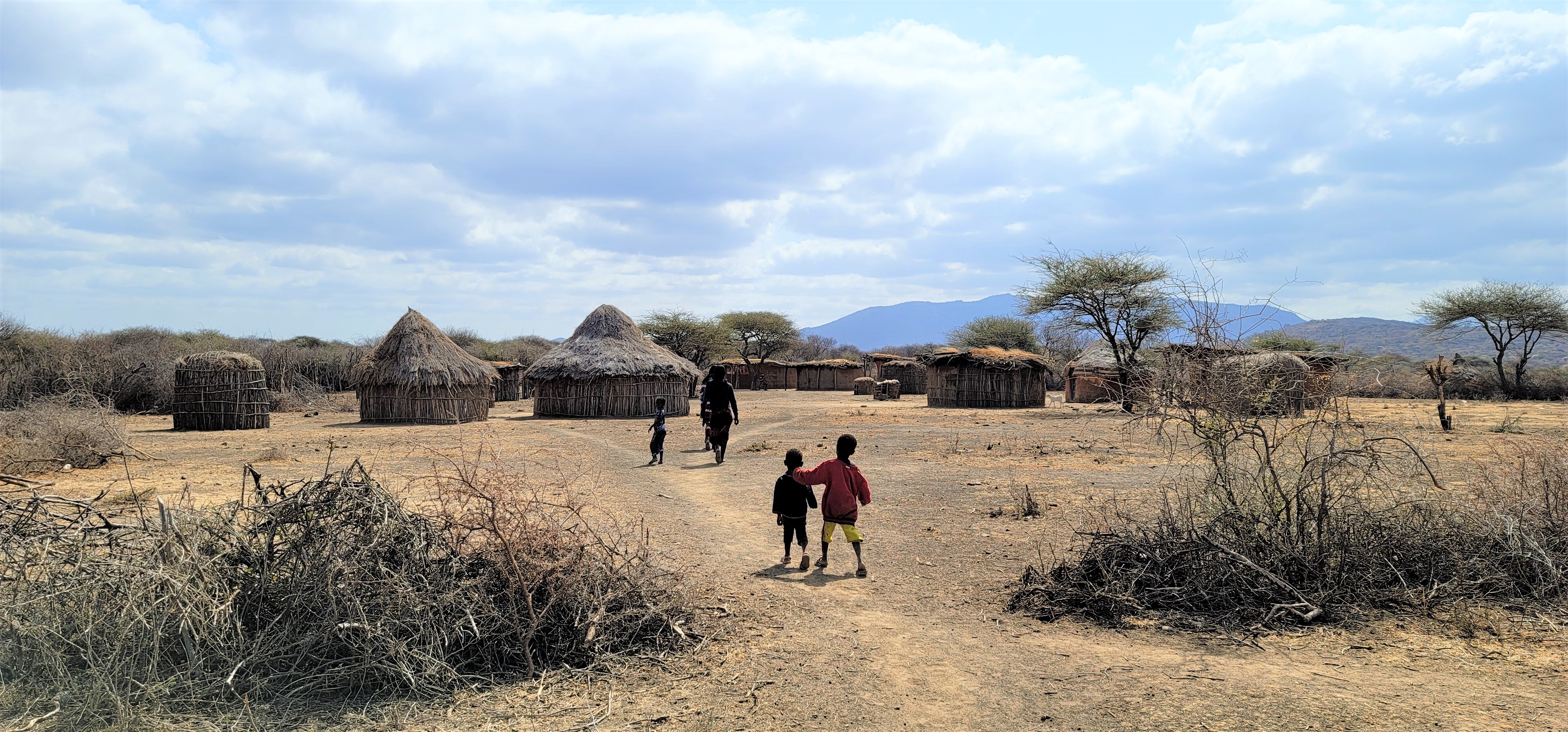
Photo credit: Ayenew Haileselassie, Abt Associates
A pastoralist village in Dillo Woreda, Oromia Region
APRIL 2022
Contracting Private Drug Vendor Improves Insurance Service in Lay Armachiho, Amhara Region
The community-based health insurance (CBHI) office in Lay Armachiho woreda (district) in Amhara Region contracted a private drug vendor, Asfaw Norahun Drug Store, to provide prescriptions free of charge to CBHI members and their dependents. Typically, CBHI beneficiaries get their prescribed medications from the public hospital and health centers in the area without incurring out-of-pocket expenses. However, when these facilities have stockouts, CBHI beneficiaries turn to private drug stores. Before this agreement with Asfaw Norahun Drug Store, beneficiaries who could find sufficient funds purchased their medications at private drug stores and sought reimbursement from the CBHI office for their out-of-pocket expenses.
Click here to read the full article
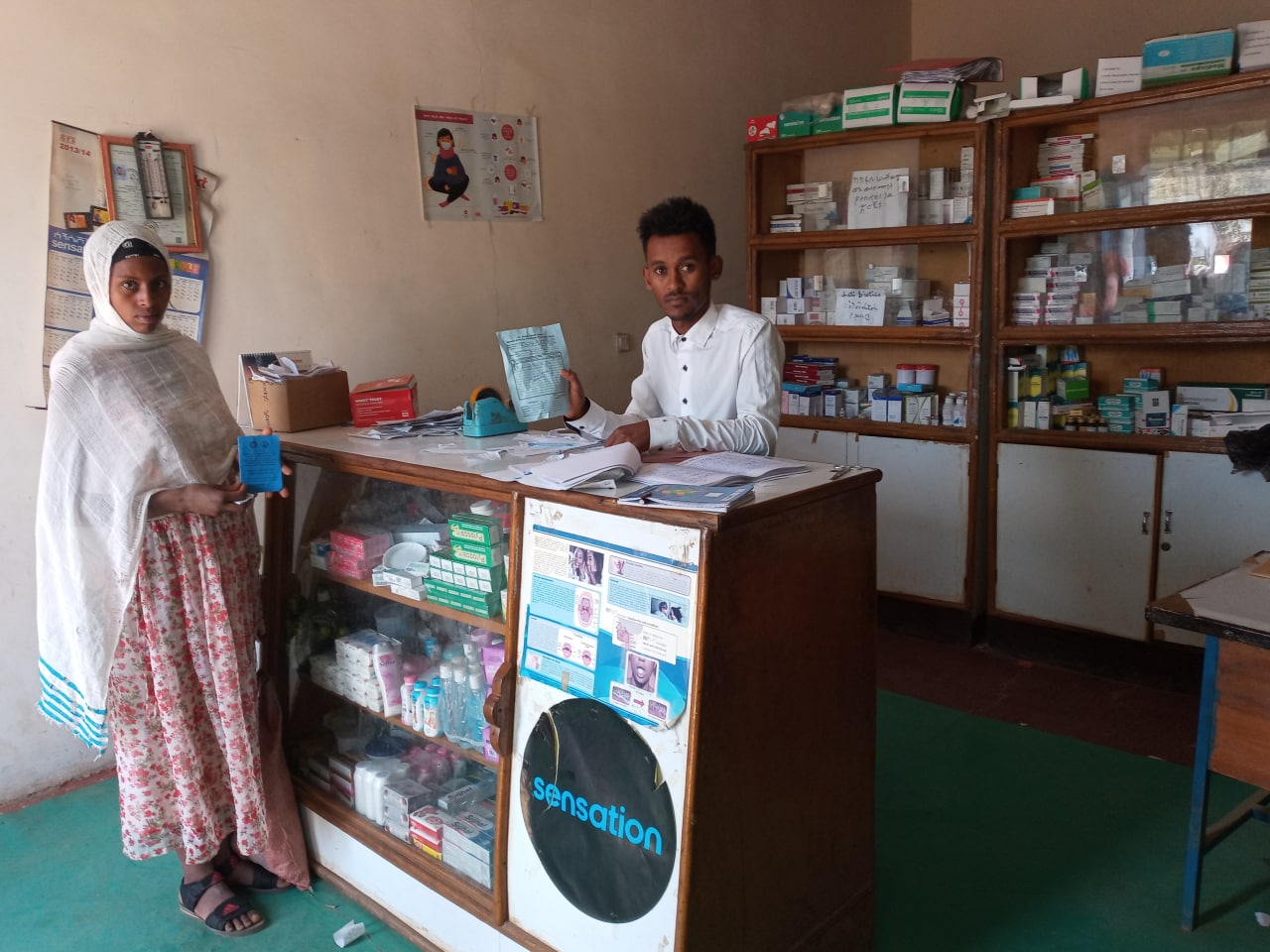
Photo credit: Abay Akalu, Abt Associates
A CBHI beneficiary gets her prescriptions at Asfaw Norahun Drug Store
APRIL 2022
Internal Revenue Improves Patient Care at Awbare Health Center in Somali Region
Awbare Health Center in Somali Region started implementing the revenue retention and utilization (RRU) health care financing reform in July 2020, following training of the center’s board members and finance personnel by the USAID Health Financing Improvement Program. Ethiopia’s RRU reform allows public hospitals and health centers to keep the revenue they generate, primarily from patient fees, and use it to pay for medical equipment, supplies, and other quality improvements.
Click here to read the full article
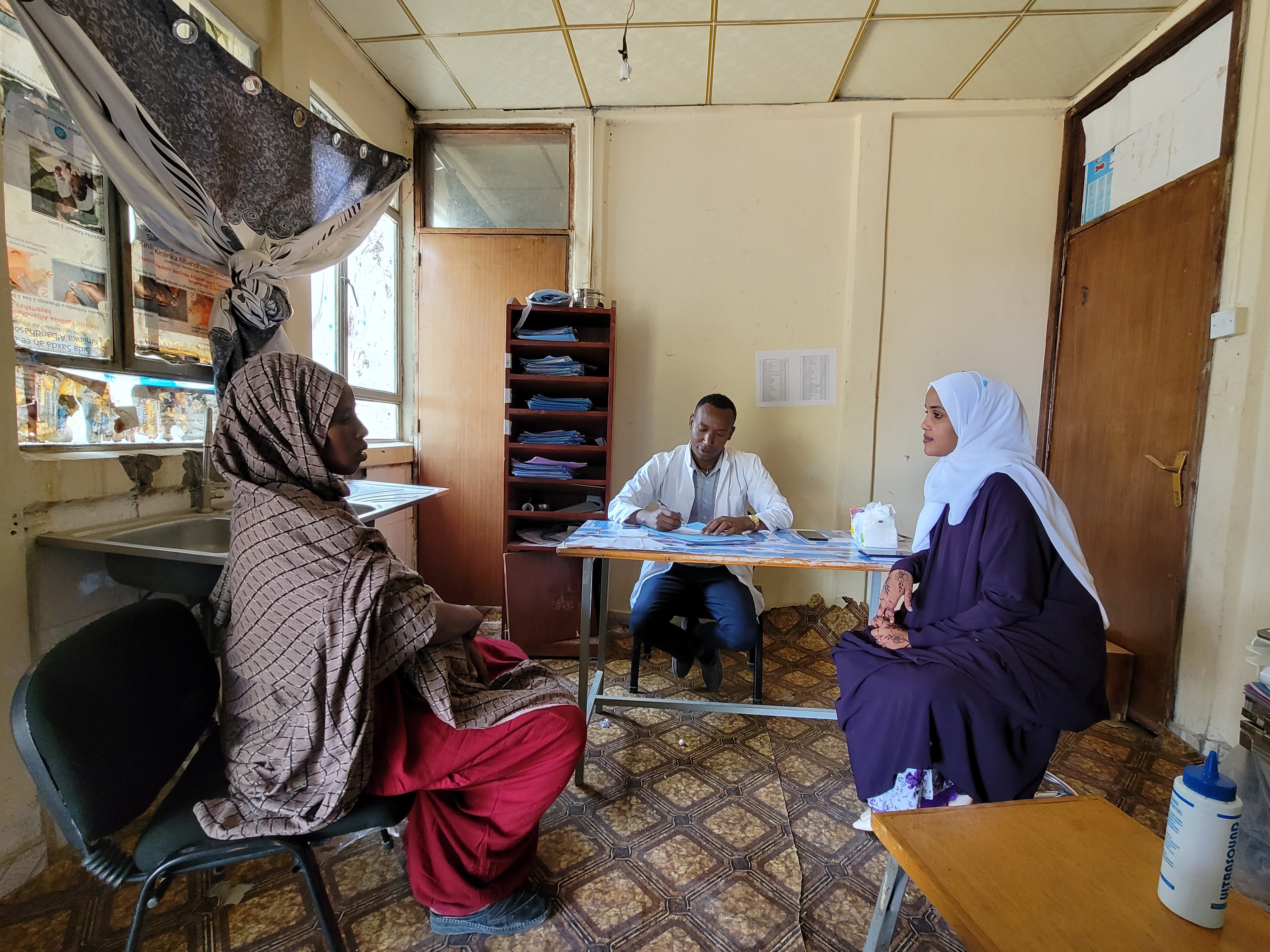
Photo credit: Ayenew Haileselassie, Abt Associates
Dr. Marelegn Antenbiye consults with a patient at Awbare Health Center, Somali Region
APRIL 2022
Harari Region Achieves Nearly 100% Community-Based Health Insurance Coverage
Harari Region, in eastern Ethiopia, launched community-based health insurance (CBHI) in 2020 and within two years it had enrolled 99.8% of the nearly 50,000 eligible households in the region.
Harari launched CBHI in five of its nine woredas, with 31% enrollment in 2020. The following year (2021) it rolled out CBHI in all nine woredas, and enrollment increased to 52%. In December 2021 Harari’s regional health bureau (RHB) held a high-level conference to rally stakeholders around achieving 100% enrollment in year three of CBHI implementation (2022). The conference was attended by the regional president and deputy president, officials and staff from the RHB and Ethiopian Health Insurance Service, woreda cabinet members, CBHI coordinators, and partners.
Click here to read the full article
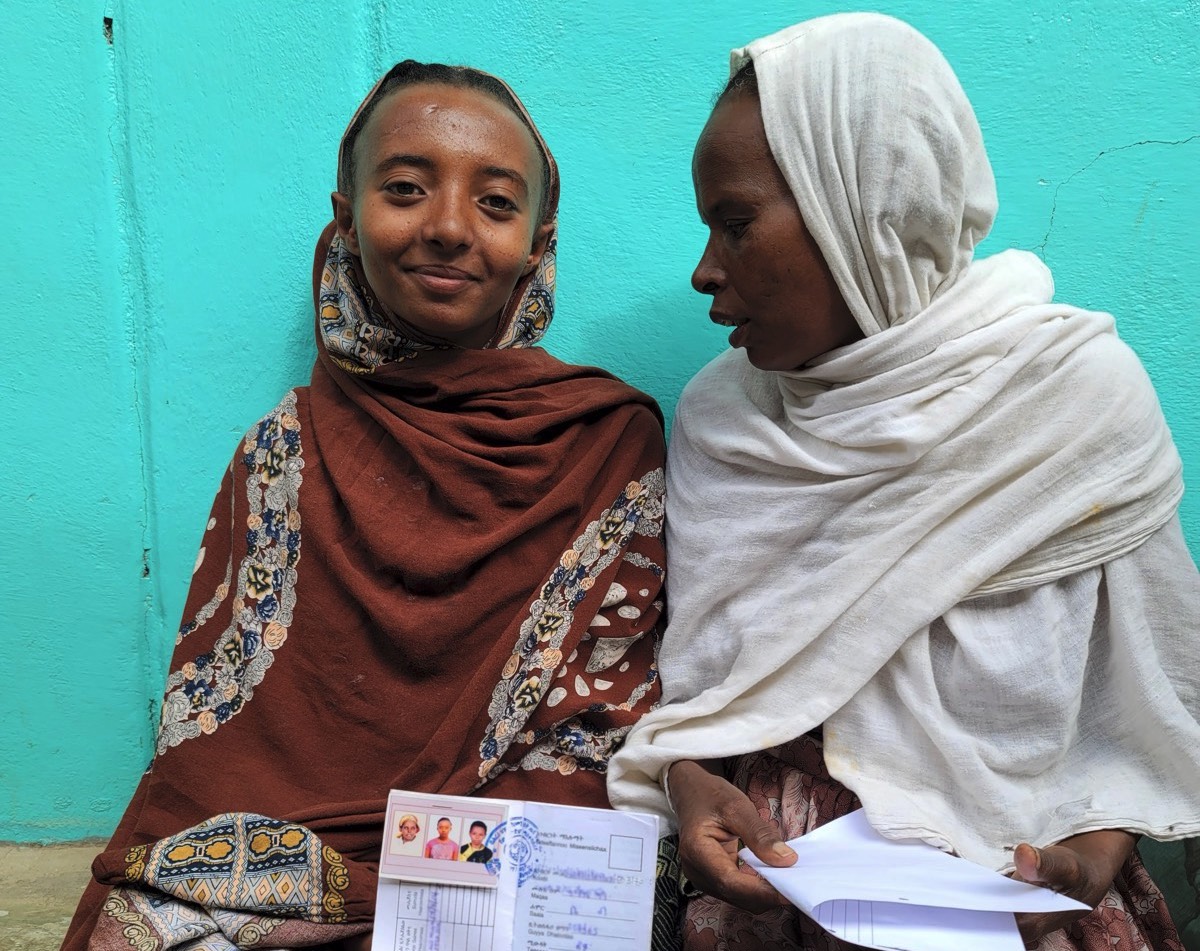
Photo credit: Ayenew Haileselassie, Abt Associates
Mother and daughter CBHI beneficiaries at Hiwot Fana Hospital, Harari Region
JULY 2021
EHIA Strengthens Medical Auditing Capacity
In March, the Ethiopian Health Insurance Agency (EHIA) in collaboration with the USAID Health Financing Improvement Program (the Program) conducted two training-of-trainers (TOT) sessions on medical auditing for 65 participants drawn from EHIA and Regional Health Bureaus (RHBs). The purpose of the training was to develop a group of trainers who will cascade the basic medical audit training and serve as a pool of experts to provide technical back-up for auditors. The TOT participants are expected to roll out the training to over 3,000 trainees in regions across most of the country, including personnel of EHIA branch offices, community-based health insurance (CBHI) schemes, zonal health departments, and woreda health offices.
Click here to read the full article
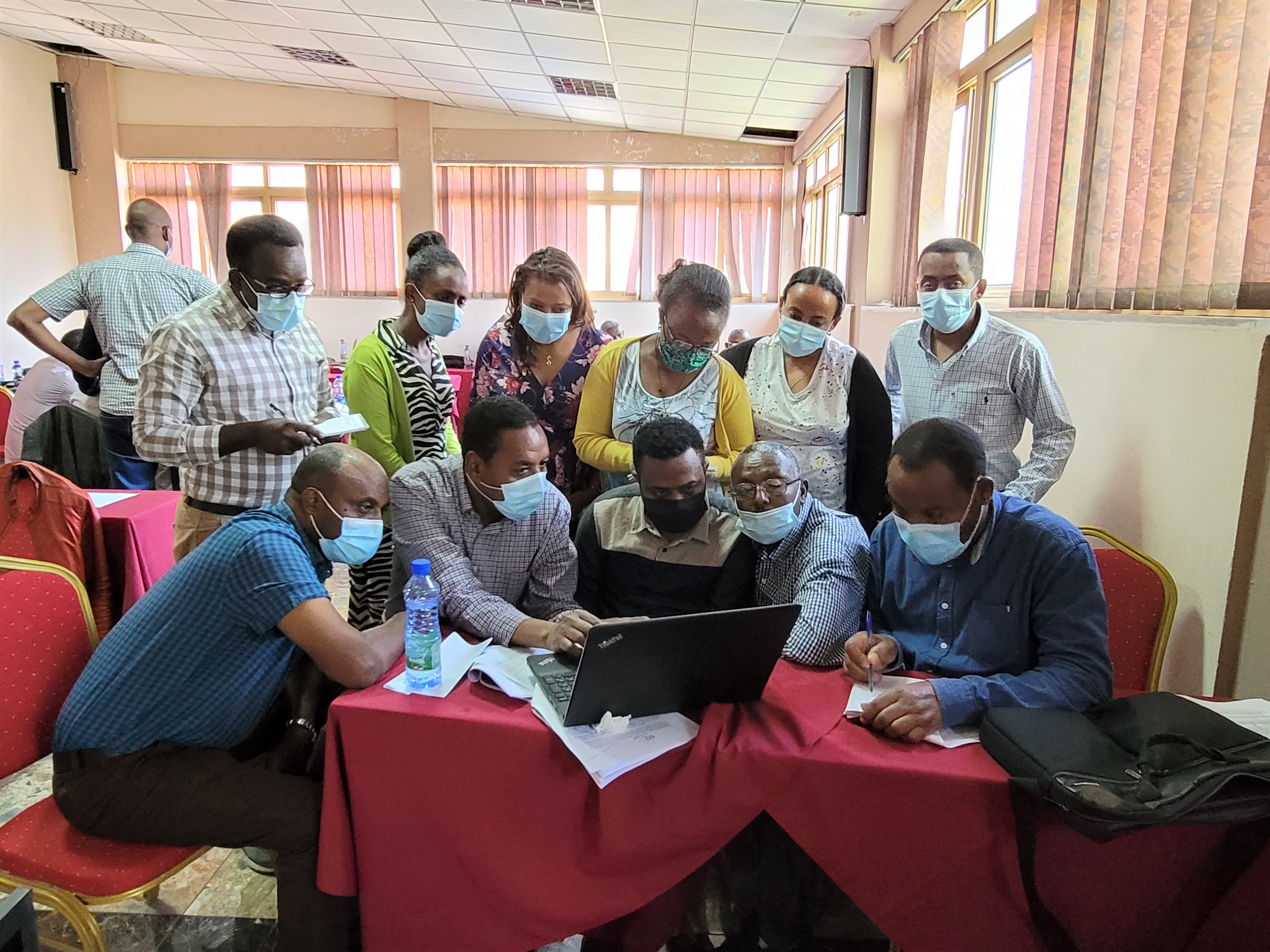
Photo: USAID Health Financing Improvement Program staff train participants in medical auditing
JULY 2021
Addis Ababa Reports High Re-enrollment Rate for CBHI Members
The Addis Ababa City Administration Health Bureau, Ethiopian Health Insurance Agency (EHIA)’s Addis Ababa branch office, and partners, including the USAID Health Financing Improvement Program (the Program) and Clinton Health Access Initiative, reviewed the city’s performance in implementing community-based health insurance (CBHI) during the first six months of the current Ethiopian fiscal year which spans July 8, 2020, to July 7, 2021. The meeting, organized with technical support from the Program, was held in Adama on April 2, 2021.
Addis Ababa piloted CBHI in one woreda in each of its 10 sub-cities in 2018. The following year, 30 woredas were added. By 2020, all 120 woredas in the city were implementing CBHI through the 10 sub-city schemes, enabling 761,000 residents to access health care services using their insurance coverage.
Click here to read the full article
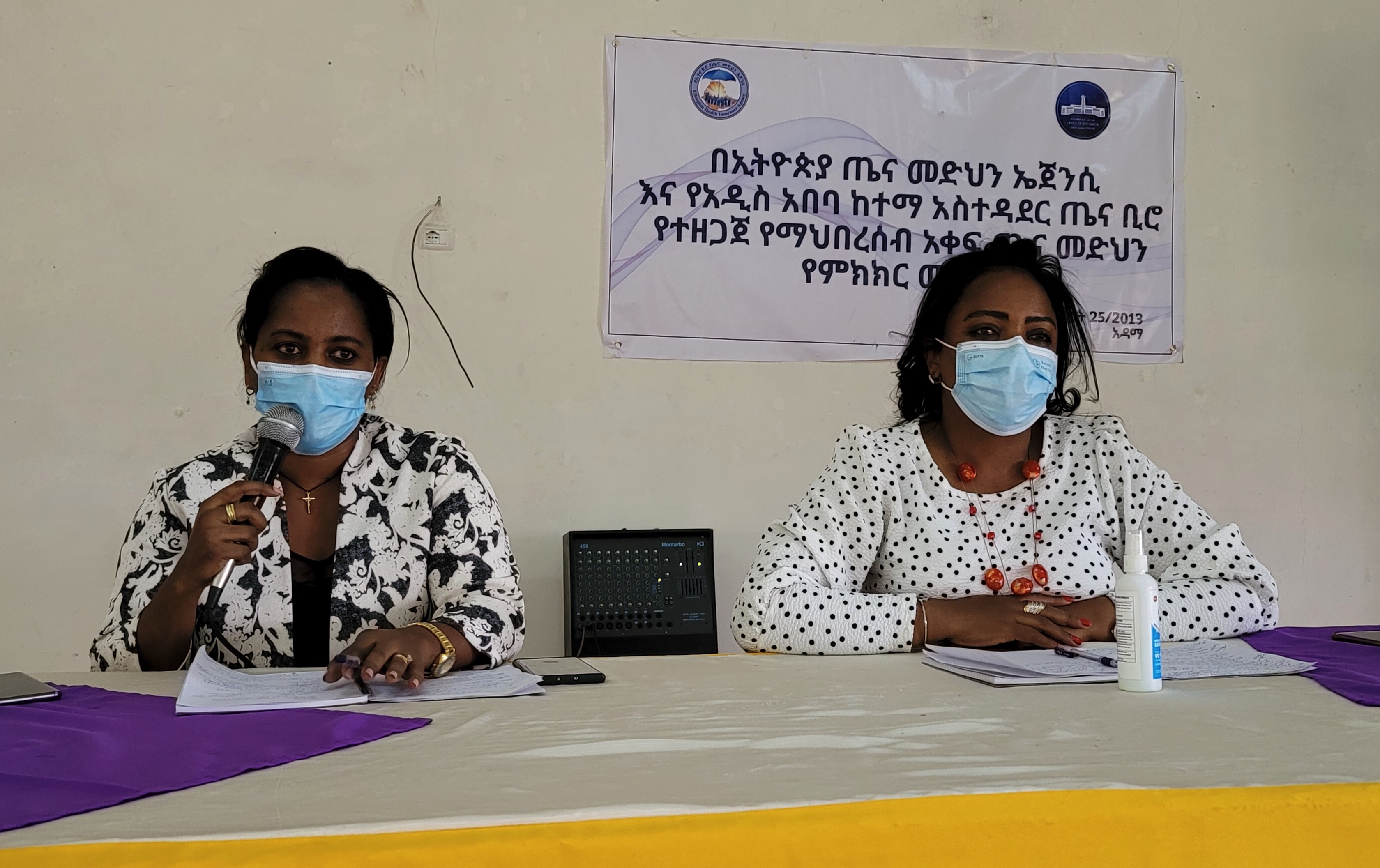
Photo: Frehiwot Abebe, Director General of EHIA (left) and Alemtsehay Elias, advisor to the Head of Addis Ababa Health Bureau, address the review meeting
APRIL 2021
Afar Endeavors to Launch Four Woreda Insurance Schemes This Year
The Afar regional health bureau (RHB), Ethiopian Health Insurance Agency, and USAID Health Financing Improvement Program organized a regional-level workshop on January 14, 2021, to kick off community mobilization in a bid to launch community-based health insurance (CBHI) in four woredas: Afambo, Berahle, Chifra, and Megale. Afar already launched CBHI in Asayita woreda. Woreda administrations and health offices conduct mobilization activities to raise community awareness and understanding of the CBHI program and encourage enrollment.
The workshop was co-chaired by the head of the Office of the President of the regional government, Gulbile Sule; the head of the Afar RHB, Engineer Mohammed Toyib; and the RHB deputy head, Nuru Mohammed. More than 200 participants from the Bureau of Finance and Economic Development, Bureau of Labour and Social Affairs, zonal administrations, woreda governments, woreda health offices, and implementing partners attended the workshop, which focused on sensitizing zonal administrators, woreda administrators, and heads of woreda health offices.
Click here to read the full article
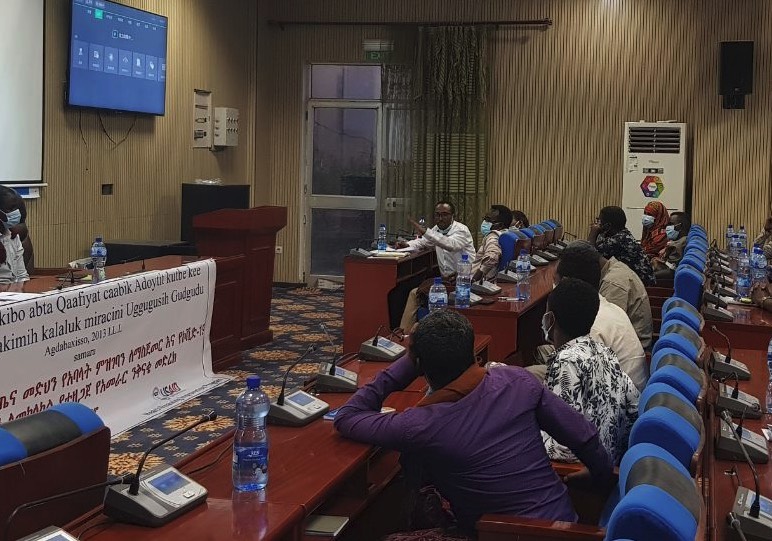
Photo: Afar workshop participants
APRIL 2021
Afar, Benishangul-Gumuz, Gambella, and Somali Expand CBHI Coverage
The Ethiopian Health Insurance Agency (EHIA) organized a two-day workshop to align regional and stakeholder plans for implementing community-based health insurance (CBHI) in Afar, Benishangul-Gumuz, Gambella, and Somali. The event was held on January 1-2, 2021, in Adama town and was organized with technical support from the USAID Health Financing Improvement Program. The participants and stakeholders at the workshop included representatives from the regional health bureaus (RHBs), EHIA head and branch offices, Clinton Health Access Initiative (CHAI), the USAID Health Financing Improvement Program, and special support officers assigned to the regions by the Ministry of Health.
Click here to read the full article
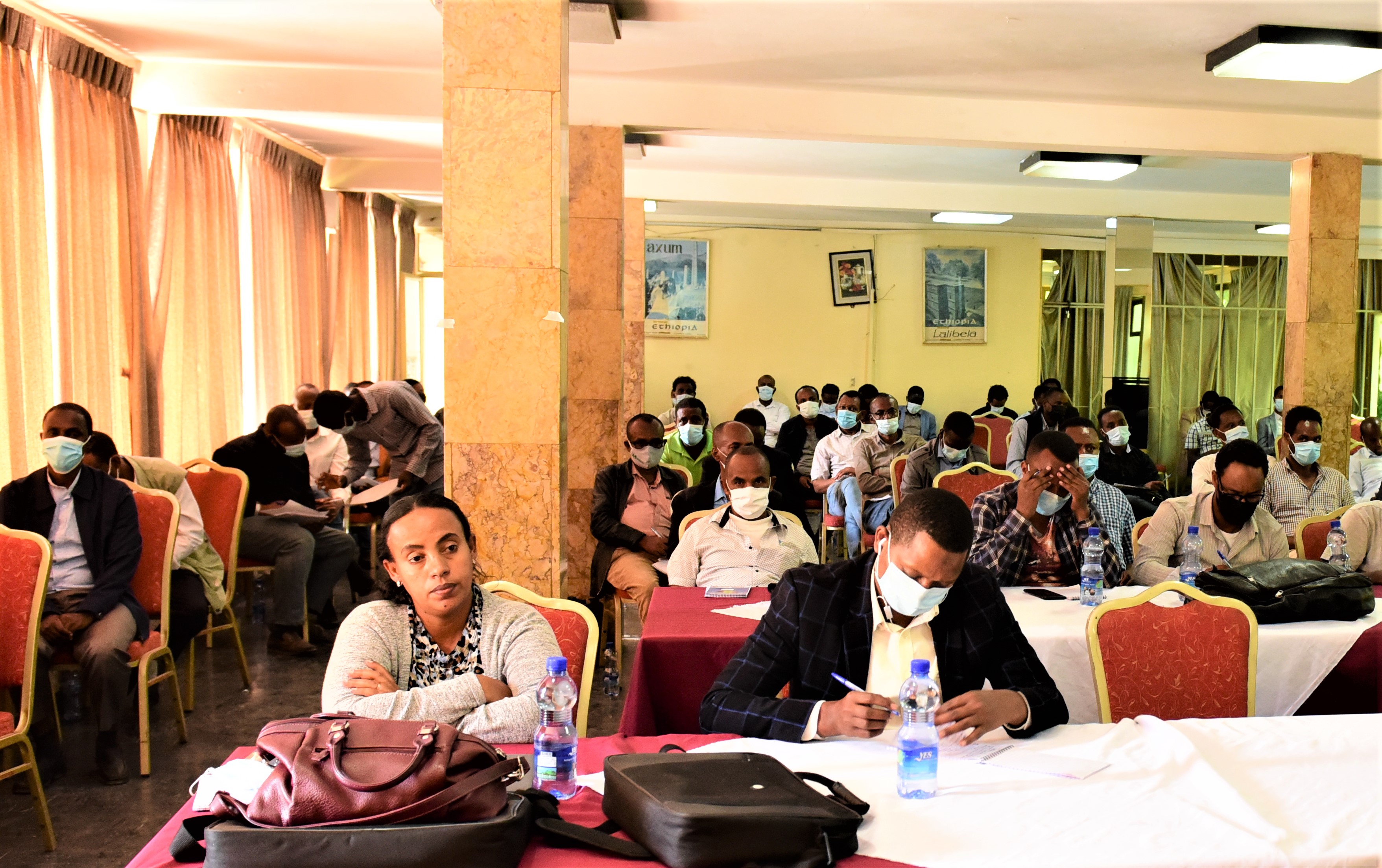
Photo credit: Ayenew Haileselassie, Abt Associates
Workshop participants
JANUARY 2021
Kebri Dehar General Hospital in Somali Region Transforms Services Using Retained Revenue
Somali is one of Ethiopia’s four Developing Regional States. It started implementing HCF reforms later than the reform-advanced agrarian regions of Amhara, Oromia, Tigray, and Southern Nations, Nationalities and Peoples’ Region.
Although the Somali regional government issued its proclamation to implement HCF reform in 2012, the endorsement of other legislations, the adaptation of the HCF implementation manual, and other activities that support the region’s capacity to implement reforms has been a slow process. However, considerable progress has been attained over the past few years with USAID technical assistance. Building implementation capacity for the HCF reforms has been a key area of USAID technical assistance.
Click here to read the full article
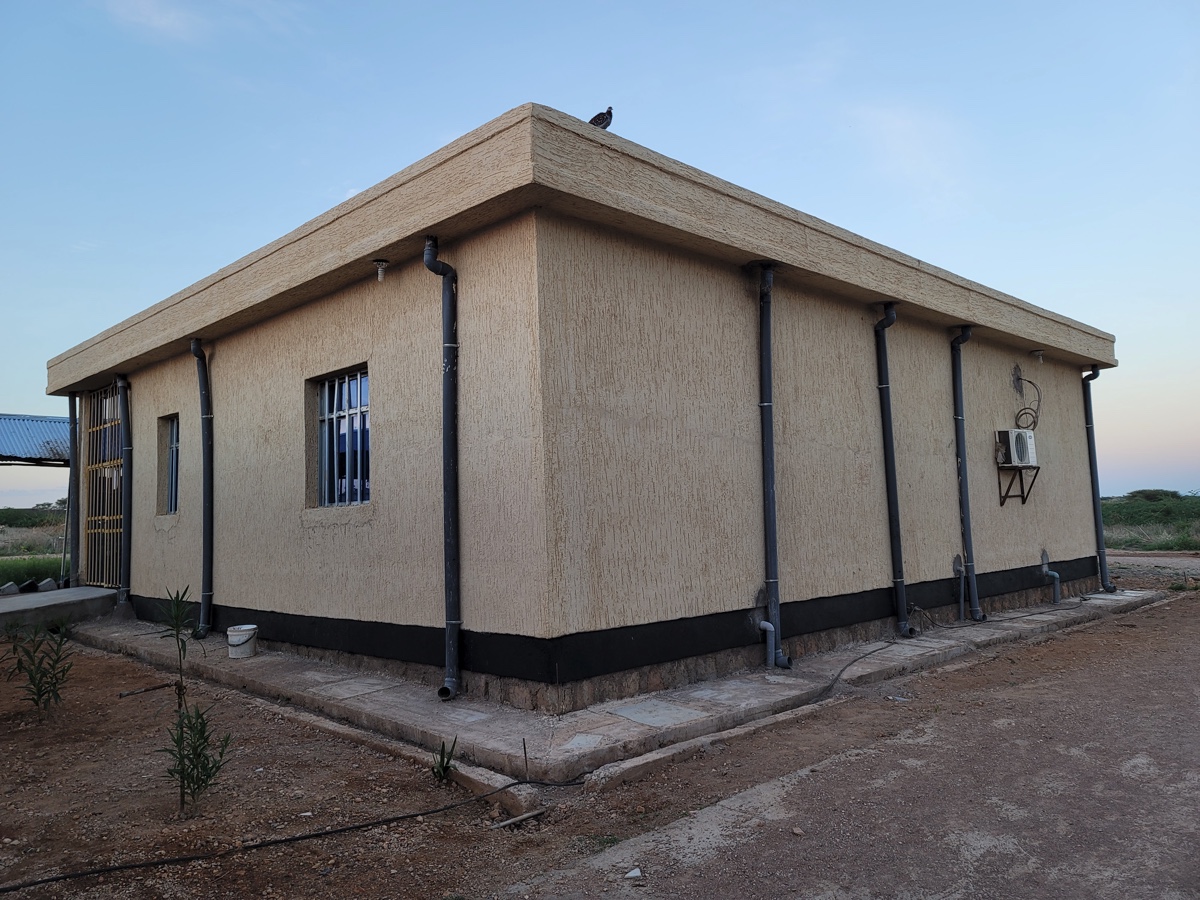
Photo credit: Ayenew Haileselassie, Abt Associates
Kebri Dehar Hospital operating room built using retained revenue
JANUARY 2021
Zonal CBHI Scheme in Amhara Improves Access to Referral Hospitals
For poor and low-income families, the biggest roadblock to adequate health care is having enough money to pay for it. In systems where payment is required at the time of care, many avoid or delay seeking treatment because they are unable to pay or fear impoverishing costs. To improve financial protection and use of health services, the Ethiopian government has introduced community-based health insurance (CBHI) across the country. The program makes health care services more accessible by reducing the financial risk and burden of obtaining it.
CBHI members and their dependents are entitled to access curative health services without incurring out-of-pocket expenses when obtaining them at contracted health facilities. Households can join the program by paying an annual premium. These funds are then pooled together along with government subsidies, and used by woreda-level CBHI schemes to reimburse health facilities for the services obtained by CBHI beneficiaries.
Click here to read the full article
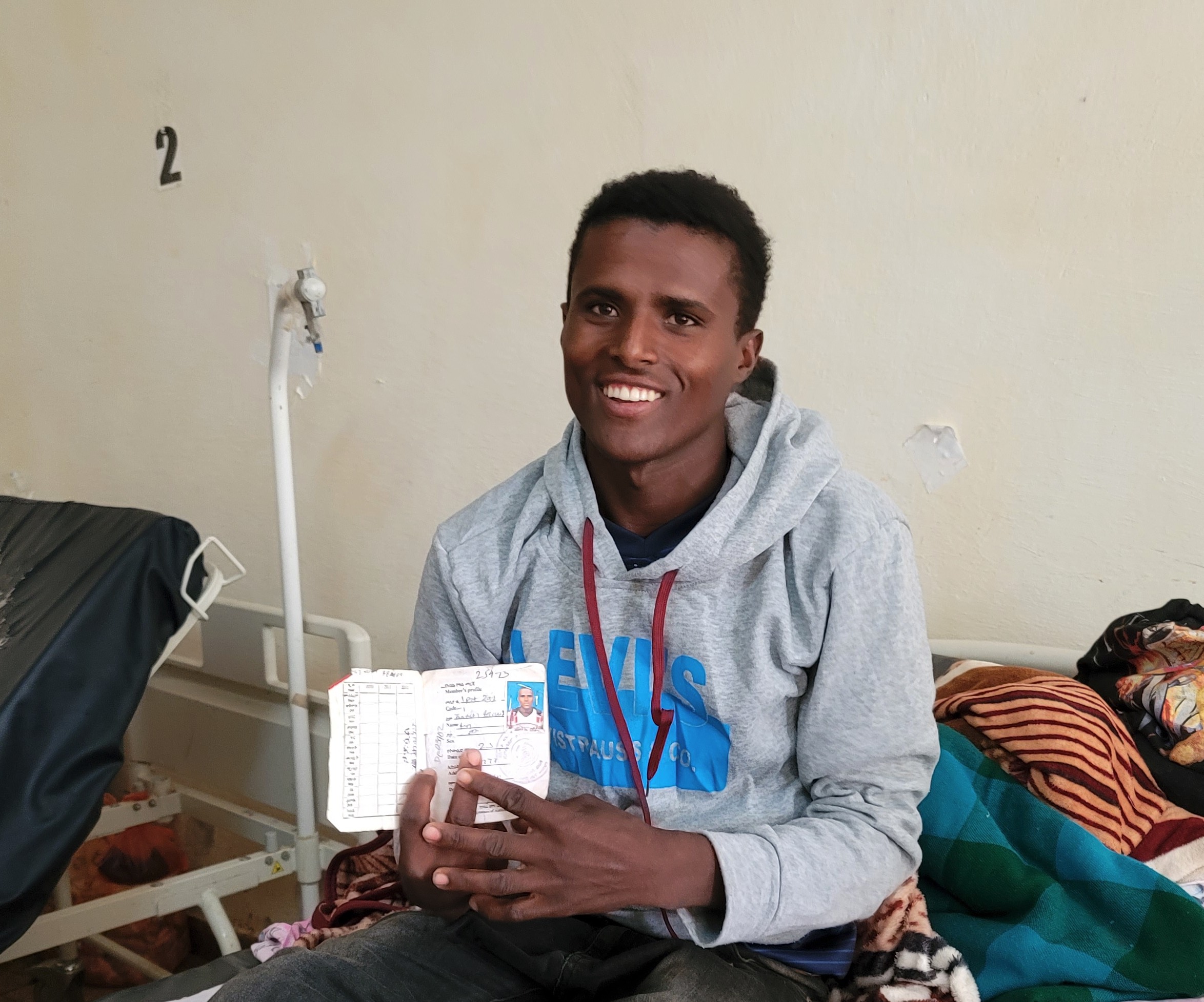
Photo credit: Ayenew Haileselassie, Abt Associates
A CBHI member who accessed referral surgery at Debre Markos Referral Hospital and had the costs covered by the East Gojjam zonal pool
SEPTEMBER 2020
Oromia Approves Staffing Structure for HCF Reform Institutionalization
In mid-May 2020, Oromia Region enhanced its capacity to spearhead and implement health care financing (HCF) reforms by putting in place a regional organizational structure and related staffing positions. The structure also links to HCF structures and personnel at zonal and woreda health offices to further facilitate reform implementation. HCF structures and personnel are fundamental steps to institutionalize reforms within the government system.
Though government owned and led, USAID has supported HCF reform implementation, including via the USAID Health Financing Improvement Program. The Program delivered technical assistance to federal and regional governments to develop the organizational structures recently approved in Oromia.\
Click here to read the full article
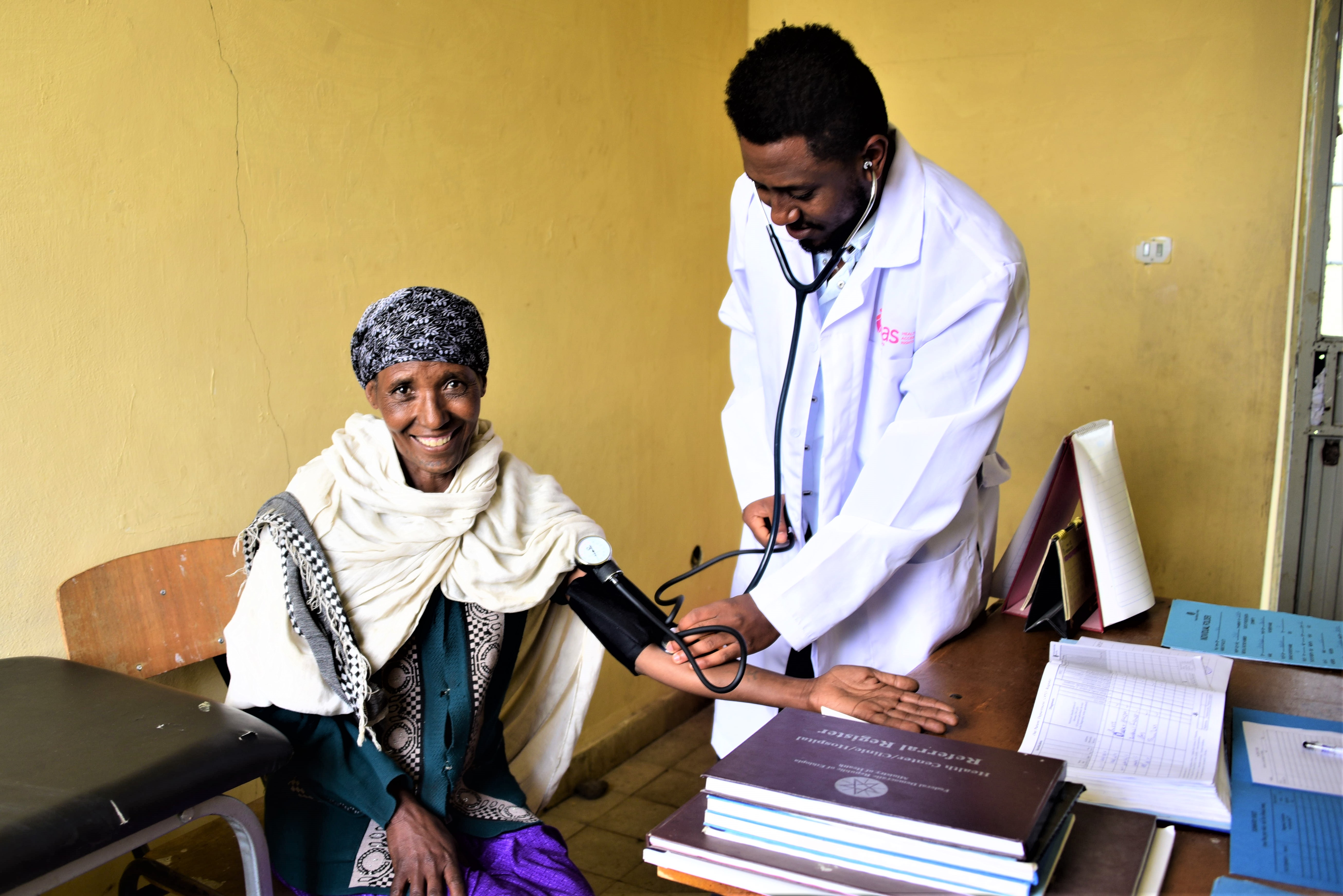
Photo credit: Ayenew Haileselassie, Abt Associates
Health care financing reforms help improve the quality of health care services
SEPTEMBER 2020
Harari Launches CBHI - the First Breakthrough in the Eastern Regions of Ethiopia
In March 2020, Harari Region launched CBHI through a regional-level scheme incorporating five of its nine woredas initially, whose combined enrollment rate was 31%, below the established enrolment rate of 50% recommended by the CBHI regulations to launch a scheme. The regional government made the bold decision so eligible households could see the benefits of CBHI membership, bearing the risk of financial deficit on itself.
Harari Region in eastern Ethiopia is home to 256,645 people in 65,760 households in three rural and six urban woredas. Of these, 47,803 households earn a living from the informal sector, the criterion for eligibility to join Community-Based Health Insurance (CBHI). Harari initiated the planning for introducing CBHI in the region back in 2017.
Click here to read the full article
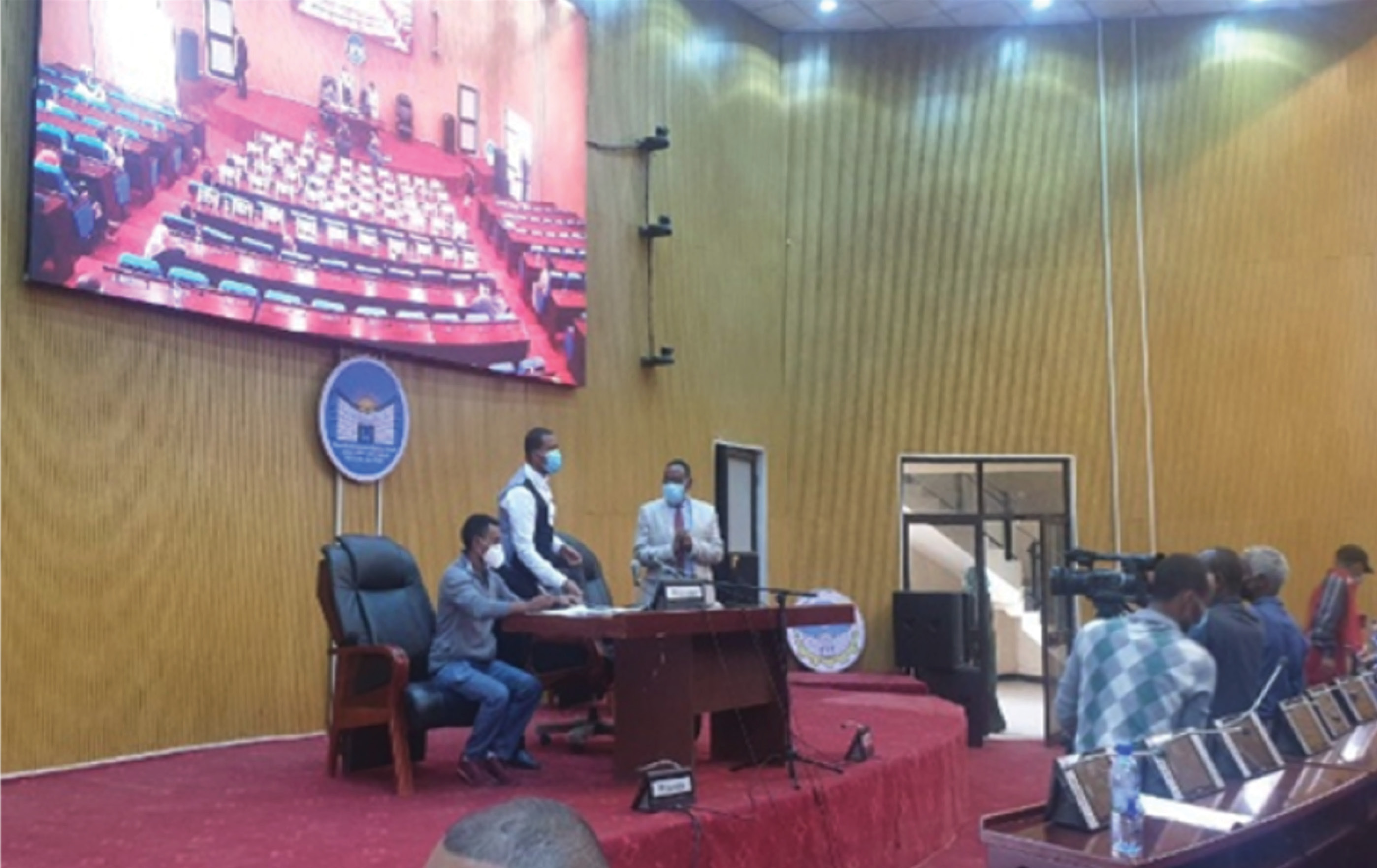
Photo: CBHI launch event, Harari Region
SEPTEMBER 2020
Building a Model CBHI Scheme in Raya Azebo
Raya Azebo, one of eight woredas in the Debubawi (Southern) Zone of Tigray region, has a population of 157,137. It launched community-based health insurance (CBHI) in 2014/15 to offer financial protection to households in the informal sector for an annual contribution of 240 Birr (US$6.90). For the past three years, Raya Azebo has averaged more than 80% enrollment rate in this insurance scheme.
Click here to read the full article
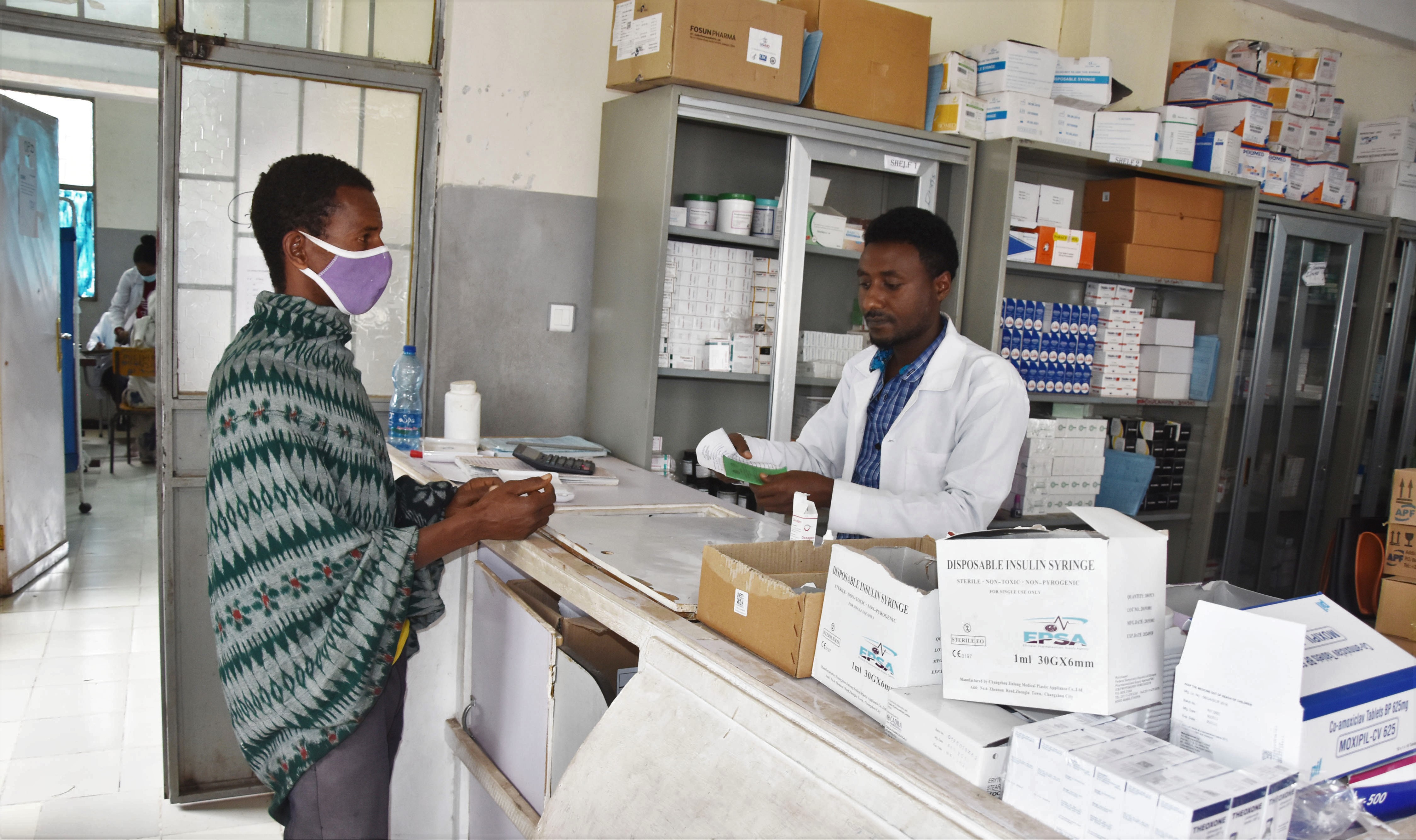
Photo credit: Ayenew Haileselassie, Abt Associates
CBHI member presents his CBHI card to get a prescription filled at the Mehoni Primary Hospital pharmacy, Raya Azebo, Tigray
APRIL 2020
Update on First-Generation Health Care Financing Reforms
USAID, through its successive activities, has supported the government of Ethiopia to implement HCF reforms since the development and adoption of the 1998 Health Care Financing Strategy. The first set of HCF reform interventions, also known as the ‘first-generation’ HCF reforms, began in the early to mid-2000s and focus on improving the supply-side of the health service delivery systems.
These supply-side HCF reforms have taken root in all of the major regions and city areas: Amhara, Harari, Oromia, SNNP, and Tigray regions as well as Addis Ababa and Dire Dawa city administrations. For instance, around 96% of health centers and 99% of the hospitals in these locations have gained management autonomy by establishing and functioning under their governing boards. These health centers and hospitals are successfully implementing the revenue retention and use (RRU) reform.
Click here to read the full article
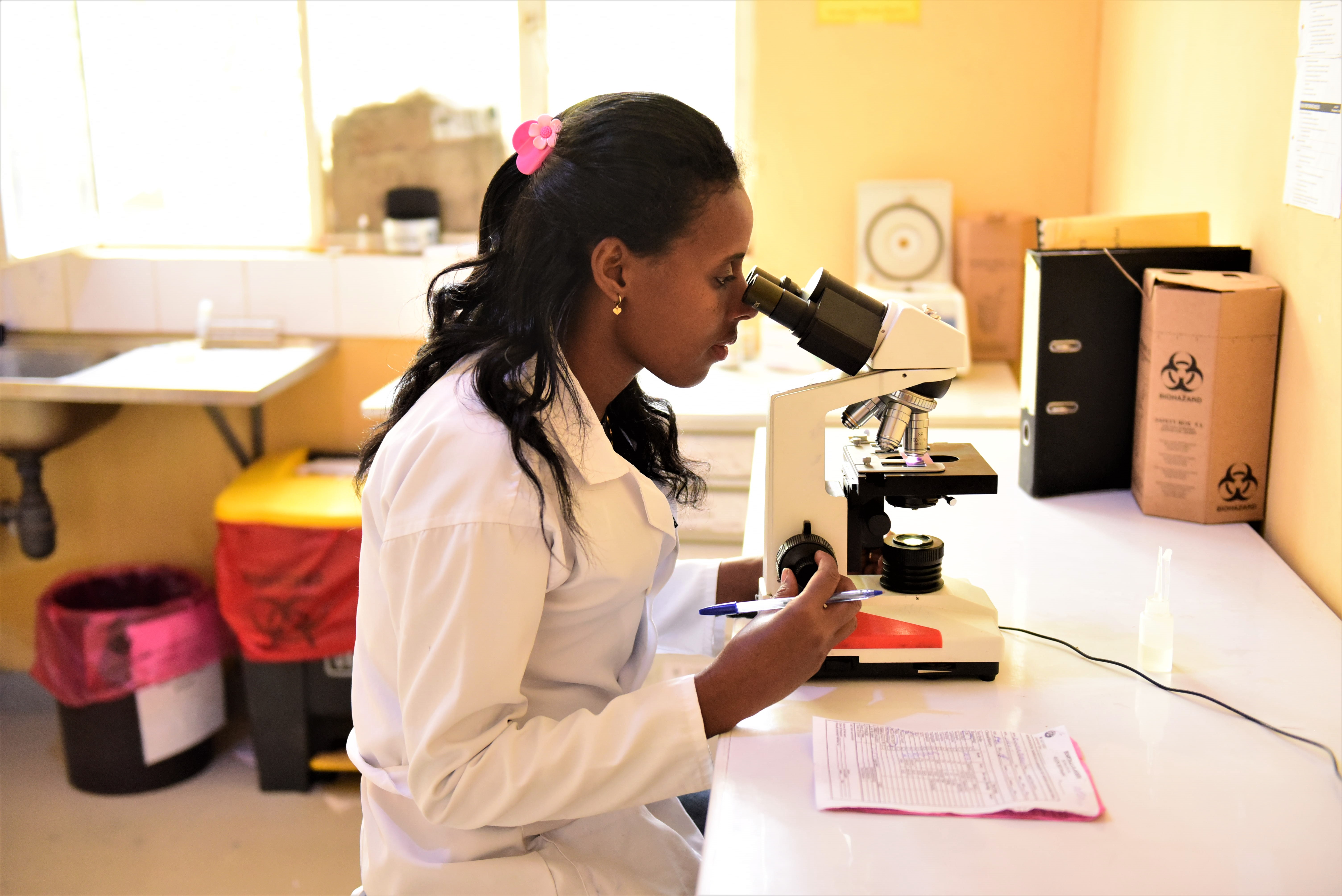
Photo credit: Ayenew Haileselassie, Abt Associates
A lab technician uses a microscope purchased with retained internal revenue
APRIL 2020
Initiative on Institutionalization of Health Care Financing Reforms
With technical support from the USAID Health Financing Improvement Program, the MOH has developed an institutionalization/transition plan of the first-generation health care financing (HCF) reforms within the subnational government systems. This plan would enable regions/city administrations to fully institutionalize the planning, financing, implementation and management of these reform interventions and continue them with minimal or no external technical assistance from USAID Health Financing Improvement Program.
The institutionalization/transition plan initially focuses on Ethiopia’s five major agrarian regional states (Oromia, Amhara, SNNP, Tigray and Harari) and two city administrations (Addis Ababa and Dire Dawa), that together account for more than 90% of the country’s population.
Click here to read the full article
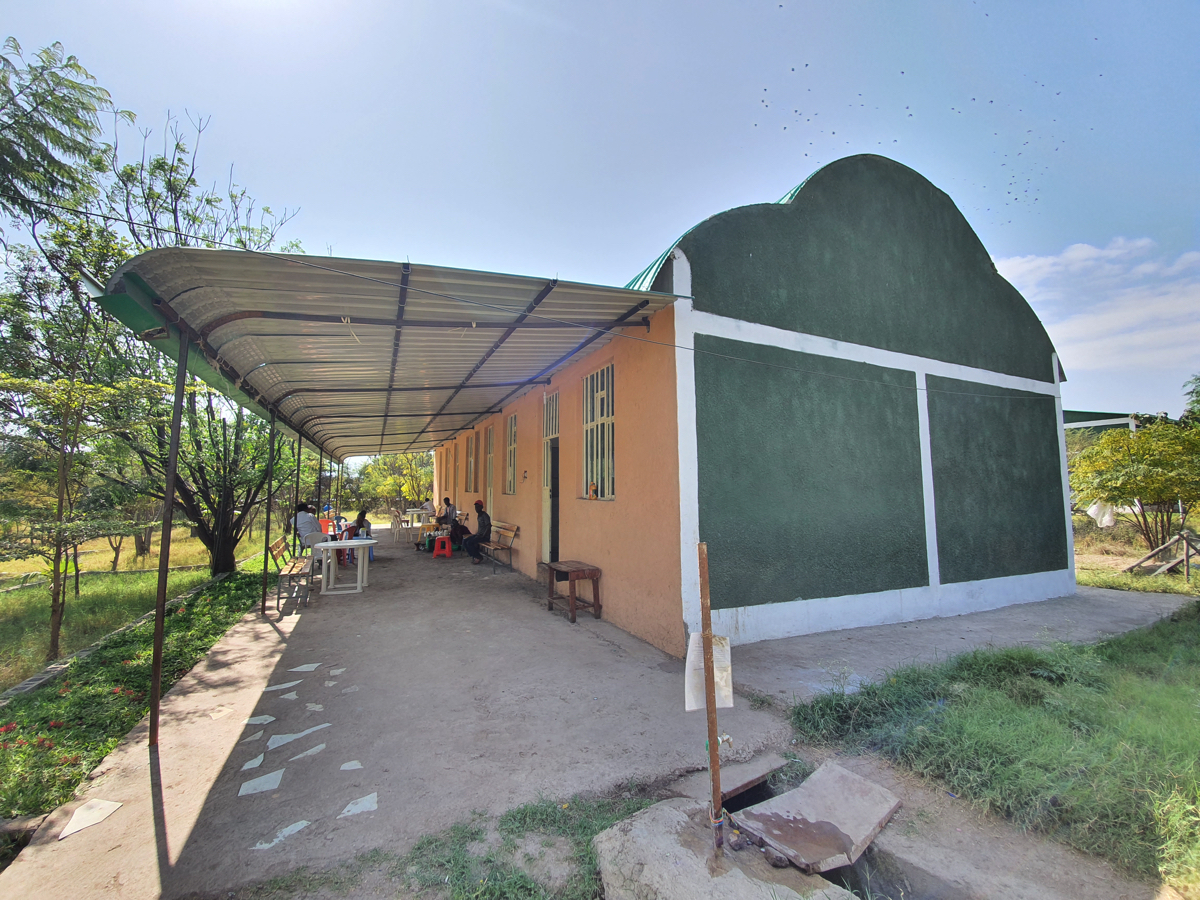
Photo credit: Ayenew Haileselassie, Abt Associates
Cafeteria at Olanchiti Primary Hospital in Oromia Region, co-financed with retained revenue
JANUARY 2020
CBHI Leadership
Key to the success of CBHI in Silti woreda is Deputy Administrator Jemila Hussein (pictured), the woreda’s top leader. She says the woreda came to the realization that health was not the job of the health sector alone.
During the general assembly a year ago and before commencement of annual CBHI mobilization, Jemila had all woreda officials—including health, finance, agriculture and educational office heads— sign a letter of commitment to CBHI success. These officials undertook daily follow-up of all CBHI activities at each kebele, including mobilization to registration, membership contribution col-lection, issuance of receipts, deposit of money in the bank, and return of used and unused receipt voucher pads to the woreda.
Jabir Hussein, CBHI Coordinator, remembers that they had to stay in the office until 8 PM to make sure reports were ready to be delivered to the woreda administration the following morning. The woreda lent them several secretaries from various sector offices to enter data on time and allocated extra vehicles and operational budget to enable various office heads to visit their kebeles—and kebele officials to visit woredas.
“We were able to finish most of the work in one week,” Jemila says. “The second week, there were only bits and pieces of work here and there. Our success in CBHI has created a feeling in us where we wish we could replicate similar success in other sectors.”
Click here to read the full article
Photo credit: Ayenew Haileselassie, Abt Associates
Jemila Hussein, CBHI Deputy Administrator, Silti Woreda, SNNP Region
JANUARY 2020
Woreda in Silti Approaches Full CBHI Enrollment
Community-based health insurance (CBHI) membership and health service utilization are surging in Silti woreda in the Silti zone of the Southern Nations, Nationalities and Peoples’ Region. In 2018/19, all 16,050 member households from the previous year renewed their membership. An additional 4,500 new households also enrolled, bringing the total to 20,493 households, or 98.1% of eligible households—the highest enrollment rate among the zone’s 13 woredas. Consistently high CBHI implementation has helped Silti woreda win awards two years in a row from the regional health bureau—including a computer and printer, which came in handy for improving their data management activities.
In Silti and other woredas throughout Ethiopia, the USAID Health Financing Improvement Program has enhanced CBHI implementers’ commitment and intensified CBHI mobilization and awareness-creation.
Click here to read the full article
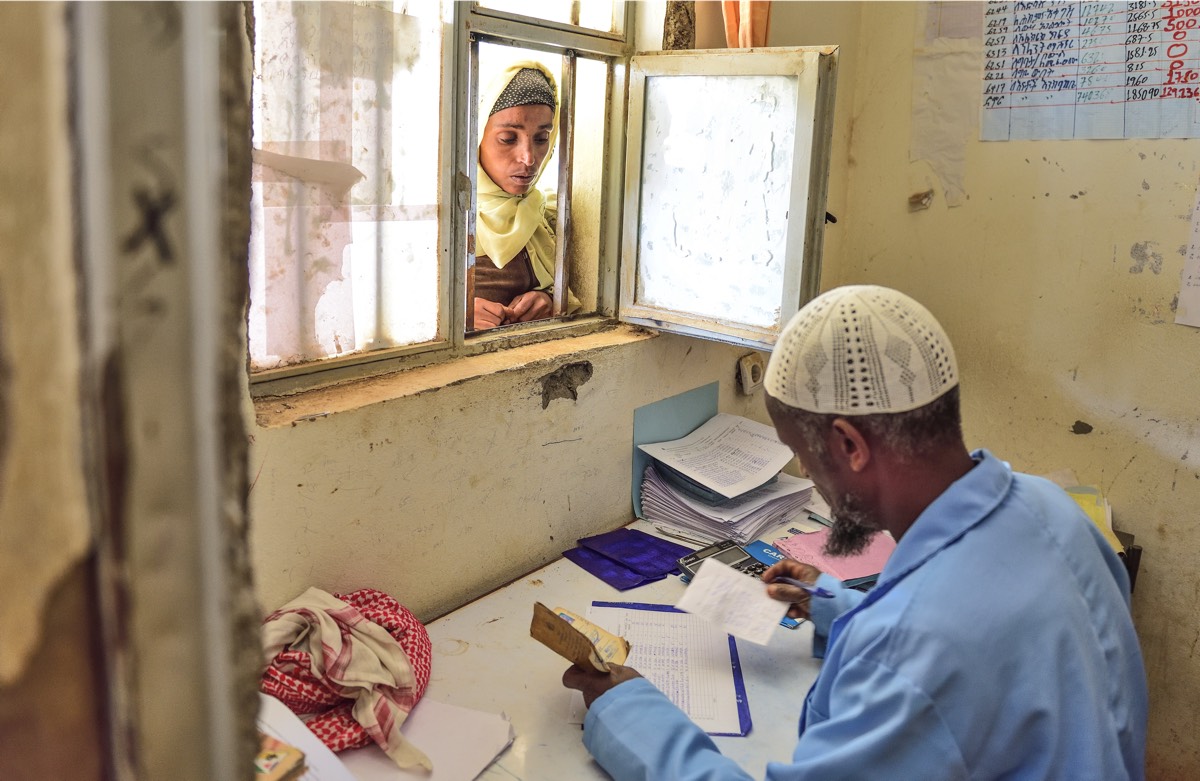
Photo credit: Ayenew Haileselassie, Abt Associates
Recording prescriptions covered by CBHI benefits. Finance Department, Kibet Hospital, Silti Woreda, SNNP
JANUARY 2020
New Health Care Financing Structure: Bedrock for Reform Institutionalization in Amhara
In the Amhara Region of Ethiopia, the USAID Health Financing Improvement Program has continued health care financing reform (HCF) activities undertaken by earlier projects since the drafting of the country’s first health financing strategy in 1998. Now in its second year (2019/20), the Program is institutionalizing its first -generation activities (see box at right). Afterward, the Program will withdraw all support to these reform components, and the relevant regional health bureaus will fully takeover using their own human resources and regional training capabilities.
Click here to read the full article
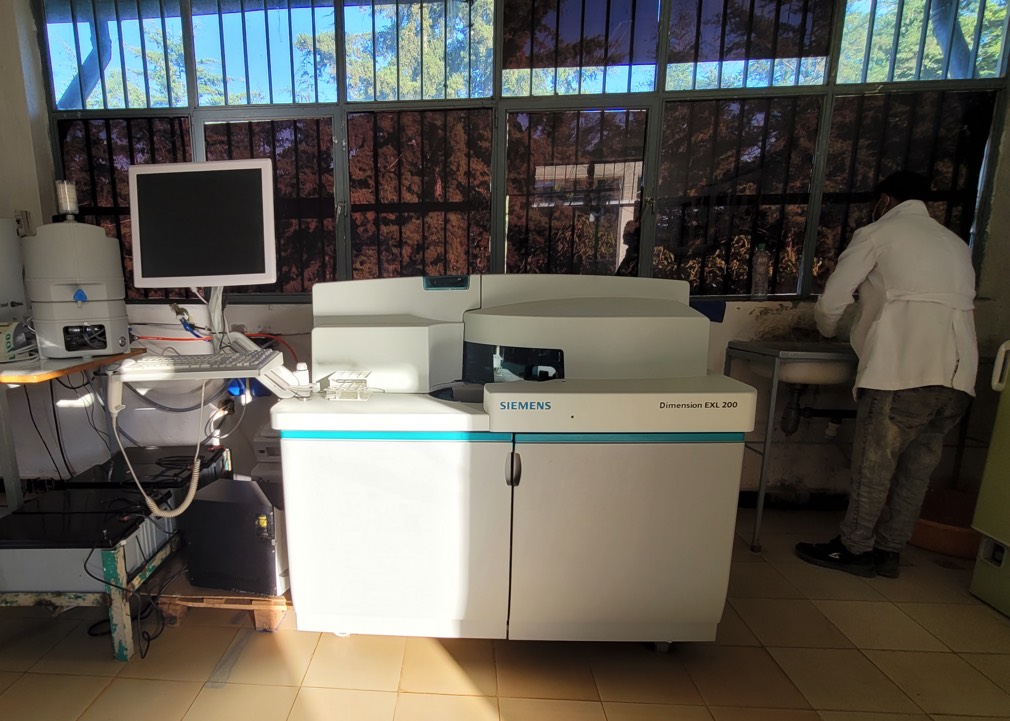
Photo credit: Ayenew Haileselassie, Abt Associates
Health care financing reforms help improve the availability of medical and laboratory equipment at health facilities
SEPTEMBER 2019
Committed Leadership Contributes to Successful CBHI Implementation in Jida Woreda
Jida and three other woredas in North Shewa zone were selected by the Oromia Regional Health Bureau (RHB) to start community-based health insurance (CBHI) in 2017/18. Of the four woredas, Jida was the only one that launched CBHI in the same year. It enrolled 72% of eligible households, which was way above the minimum requirement of 50% for initiating a CBHI scheme, and the highest enrollment rate in Oromia. By comparison, other woredas in Oromia selected for CBHI achieved less than 40%.
Currently in its second year, the CBHI renewal and new enrollment rate has reached 85% of Jida’s nearly 14,000 eligible households, representing one of the highest percentage of enrolled households in the region. Nearby woreda representatives have already started visiting the woreda to learn about the success factors contributing to Jida’s high level of performance.
Click here to read the full article
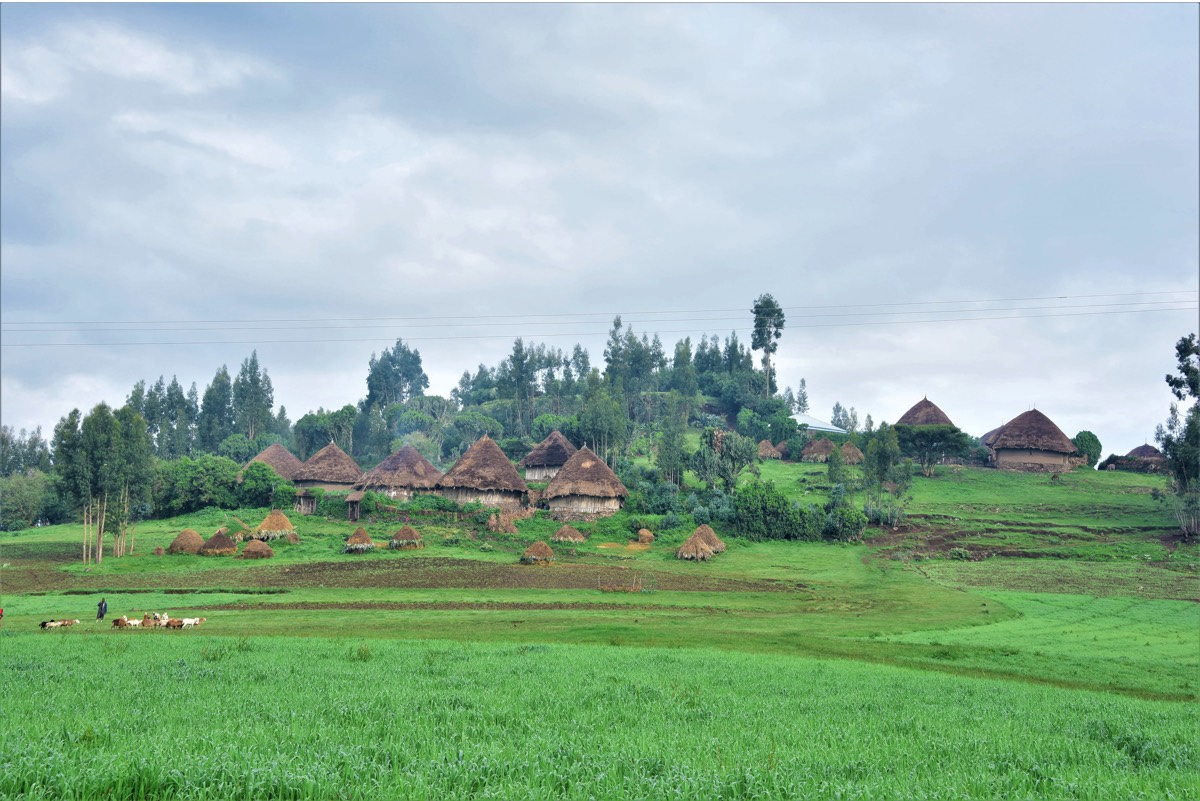
Photo credit: Ayenew Haileselassie, Abt Associates
Jida Woreda, Oromia Region
All documents are made possible by the support of the American people through the United States Agency for International Development (USAID). The contents are the responsibility of the authors and do not necessarily reflect the views of USAID or the United States Government.